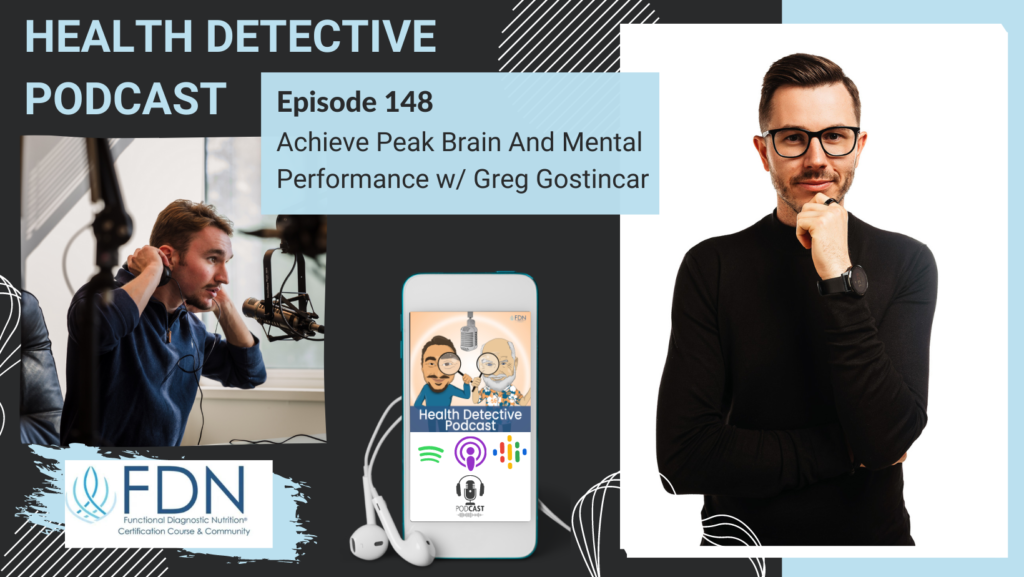Introduction
[00:00:00] Detective Ev: What is going on my friends and welcome back to another episode of the Health Detective Podcast by Functional Diagnostic Nutrition. My name is Evan Transue, AKA Detective Ev. I will be your host for today’s show. I have the pleasure of introducing Greg Gostincar whose mission in life is to help others reach their peak brain and mental performance.
Greg is our first guest from Slovenia. I thought that was pretty cool. I think we’ve had one or two other guests on from Europe, but definitely not that country. I thought that was interesting. Then it made me realize, wow, these problems are literally everywhere. You wouldn’t be having to get into this work if it wasn’t the same issues in that country or another European country or Australia as it is in the USA and Canada.
That leads me to believe what we’ve already thought for a while now in this community, this is Western lifestyle. That’s really what it is. It’s the modern lifestyle I should say, which has probably started more in America than anywhere else. I think we push this more than anywhere else in a really inappropriate way. And I think the stats back that up just with obesity, being overweight in general, child mortality, it’s pretty crazy.

The good news, if you look at this as good news, is we’re not the only ones messing this stuff up. There are other people out there doing the good work, trying to get this stuff back in control. That’s what Greg is all about in his work. He’s doing the exact same things, conceptually speaking, that we would do as Functional Diagnostic Nutrition practitioners.
Greg’s Background
But of course, Greg has his own unique insights and story. I’m going to give a little background on him really quick, and we’re going to jump right into this one.
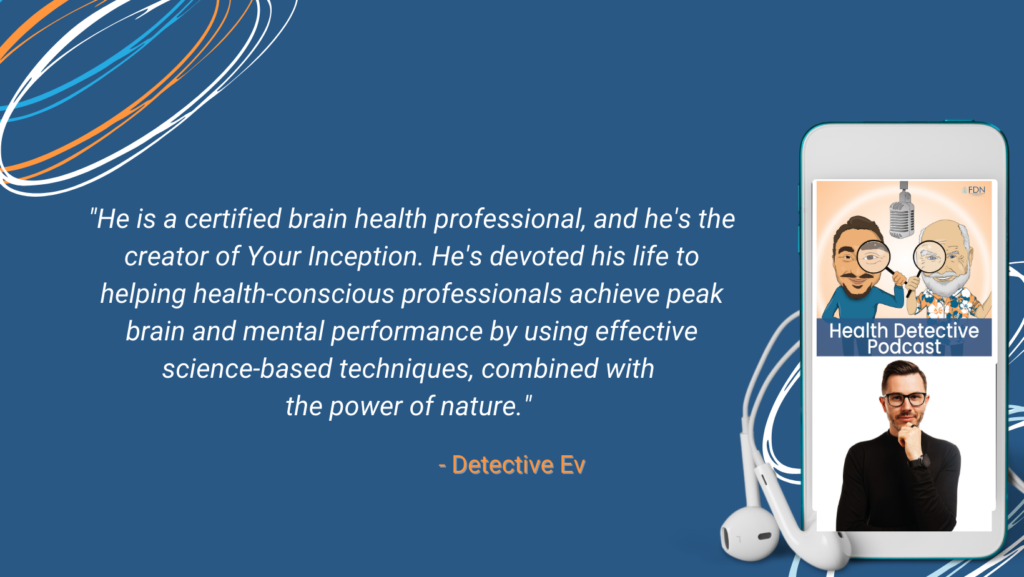
He is a certified brain health professional, and he’s the creator of Your Inception. He’s devoted his life to helping health-conscious professionals achieve peak brain and mental performance by using effective science-based techniques, combined with the power of nature. His mission is to actively educate, offer tools, and support people to unlock their true potential.
No, Greg didn’t have the craziest health story in the world, especially comparatively speaking, and that’s not a lessening of symptoms. It’s just objectively true that he did not meet any cancer diagnosis or auto immune or something like that. But he did experience a very legitimate burnout. The reason I wanted to have him on, even with not maybe having the craziest of health stories is I think many of the people who end up getting to those diagnostic levels are Type A personalities.
Is it exclusive to that? Absolutely not. But if Type A versus Type B is supposed to be roughly 50% on either side, I know for a fact that Type A personality, go, go, go get them, type of thing is way overrepresented in the people that we have on this show, the people that I have worked with as clients, and the people that many other FDNs have worked with as clients. I think that’s just because it’s one more stress on the body, right?
First Podcast Guest from Slovenia
Everyone is experiencing the crappy food and the late nights or whatever, but then you add a personality that is already under stress naturally onto that, I think it makes total sense as to why that would be happening. Greg has that go getter mentality. He definitely has that Type A personality.
I think many of us, once we get healthy and get ourselves under control, we want to know how to optimize at the next level. How can I get the most done, most efficiently without sacrificing my health? That’s exactly why we had him on today. Without further ado, let’s get to the episode.
All right. Hey there, Greg. Thanks so much for being here with us today.
[00:03:18] Greg Gostincar: Thanks for inviting me.
[00:03:20] Detective Ev: Yeah. This is cool because I know we talk to people all around the world, Australia, Canada, for sure.
I’m curious. Where are you from in Europe right now? Are you located in Europe currently?
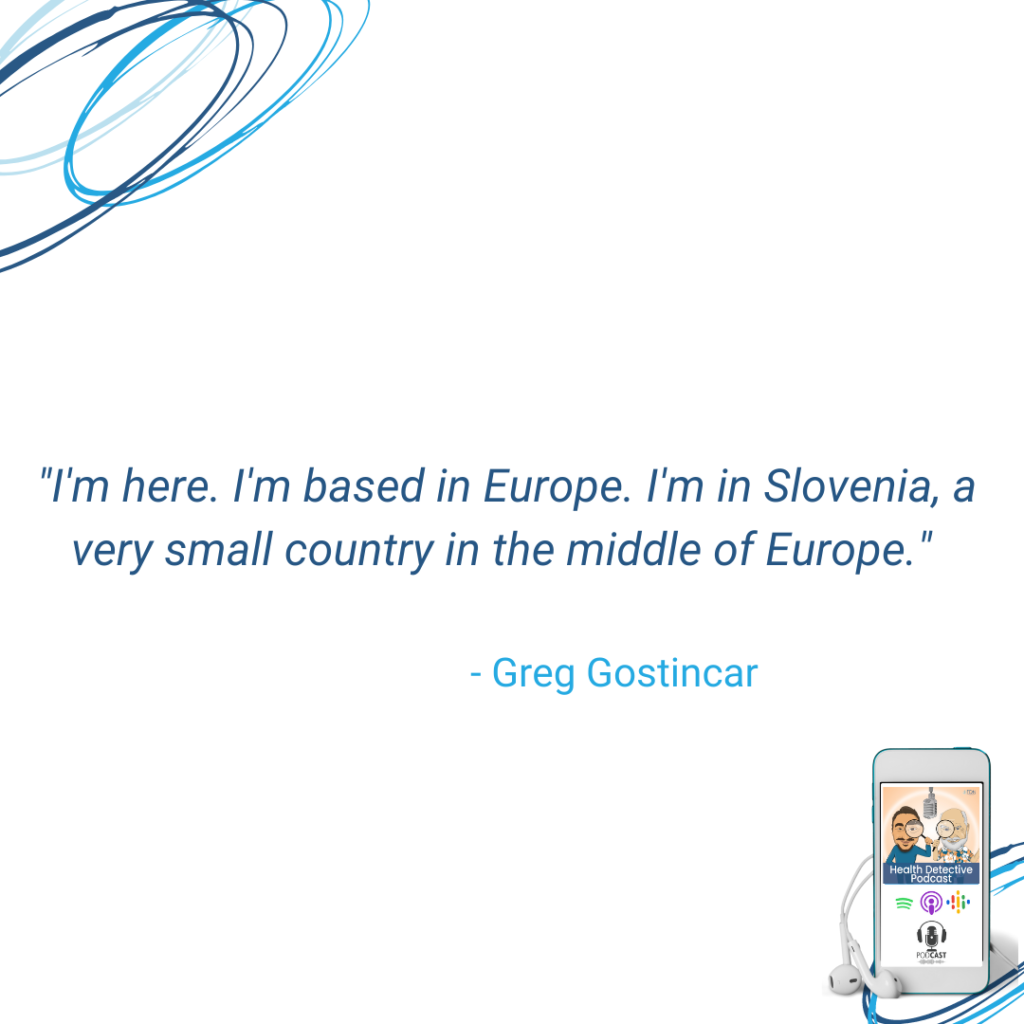
[00:03:29] Greg Gostincar: I’m here. I’m based in Europe. I’m in Slovenia, a very small country in the middle of Europe.
[00:03:34] Detective Ev: That is definitely the first guest from there. So that’s very cool. We got to hit all the countries, eventually. I got quite a way to go.
Thanks for coming on today. One of the things I wanted to start off with, because I don’t know this about you and it’s totally cool if it’s not the case, but typically the first question I always ask on the show is what health symptoms the guest might’ve dealt with. With your space and the things that you do, I’m not sure. Did you deal with health complications or was it something else that led to you getting into this work?
Crashing Before Achieving Peak Brain Performance
[00:04:00] Greg Gostincar: No, I had actually a massive burnout, two times. Actually, it was almost three times. But the last time I somehow managed to prevent it. When I was in my early twenties, it happened the first time.
I was studying at one of the best schools in Sweden in Europe. I was doing my master’s degree, at the same time, launching my first business, that was quite early for me. It was lots of stress. I had to work 80 hours plus per week, didn’t sleep much. It’s like a typical study life, if you want to achieve something very early on. It was kind of challenging.
All of a sudden, I just crashed and had no idea what happened. That was the first time. I was like, okay, I’m doing something wrong. Something is not going well. I somehow recovered quite quickly the first time. Then it happened again, a year or so after.
In the meantime, I tried to optimize my performance a bit. I started learning about biohacking and improving my health and this holistic approach, but it happened again. I was like, okay. So, I changed my diet a bit, I put more focus on sleep, I started taking some supplements, et cetera. This doesn’t seem to work.
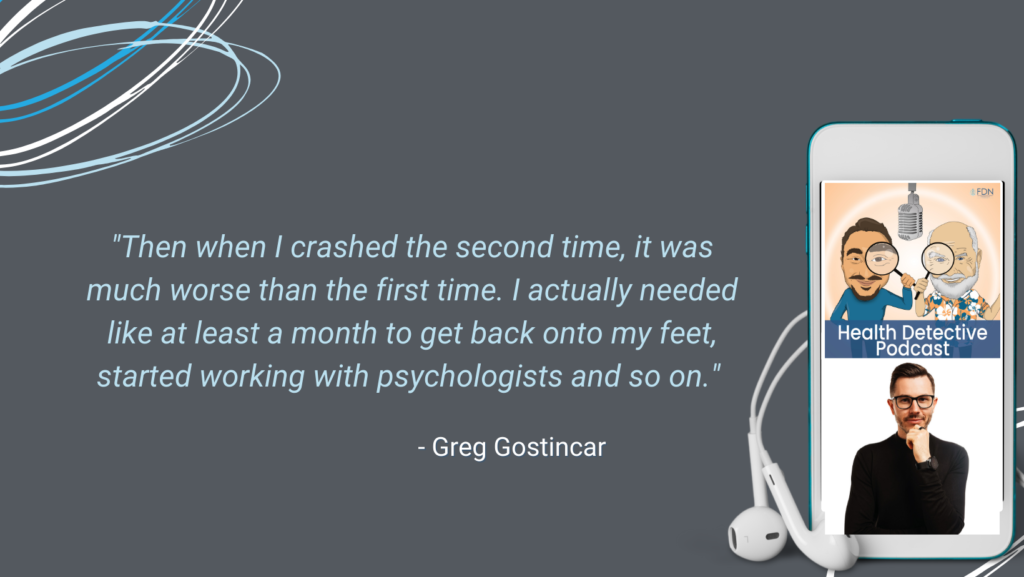
Then when I crashed the second time, it was much worse than the first time. I actually needed like at least a month to get back onto my feet, started working with psychologists and so on. It was kind of a hard one. That was the main thing that started me thinking, what’s going on here? Why is this happening and how about what we can do about it?
Working Too Hard Before Achieving Peak Brain Performance
[00:05:14] Detective Ev: Got it. So, with that first time, were you able, because a lot of the times people, I find, are not actually able to connect what’s going on. Were you worried and thinking that this is like a disease? Or was it obvious to you that, hey, I’m working my butt off, so this is what led to those feelings?
[00:05:28] Greg Gostincar: Yeah, it’s a great question. No, in the beginning I actually thought like, okay, I’m just working too much. Obviously, I didn’t sleep long enough. It was quite challenging during the weekends; we work all weekends. Either I was working for the business, for the startup, or I was studying.
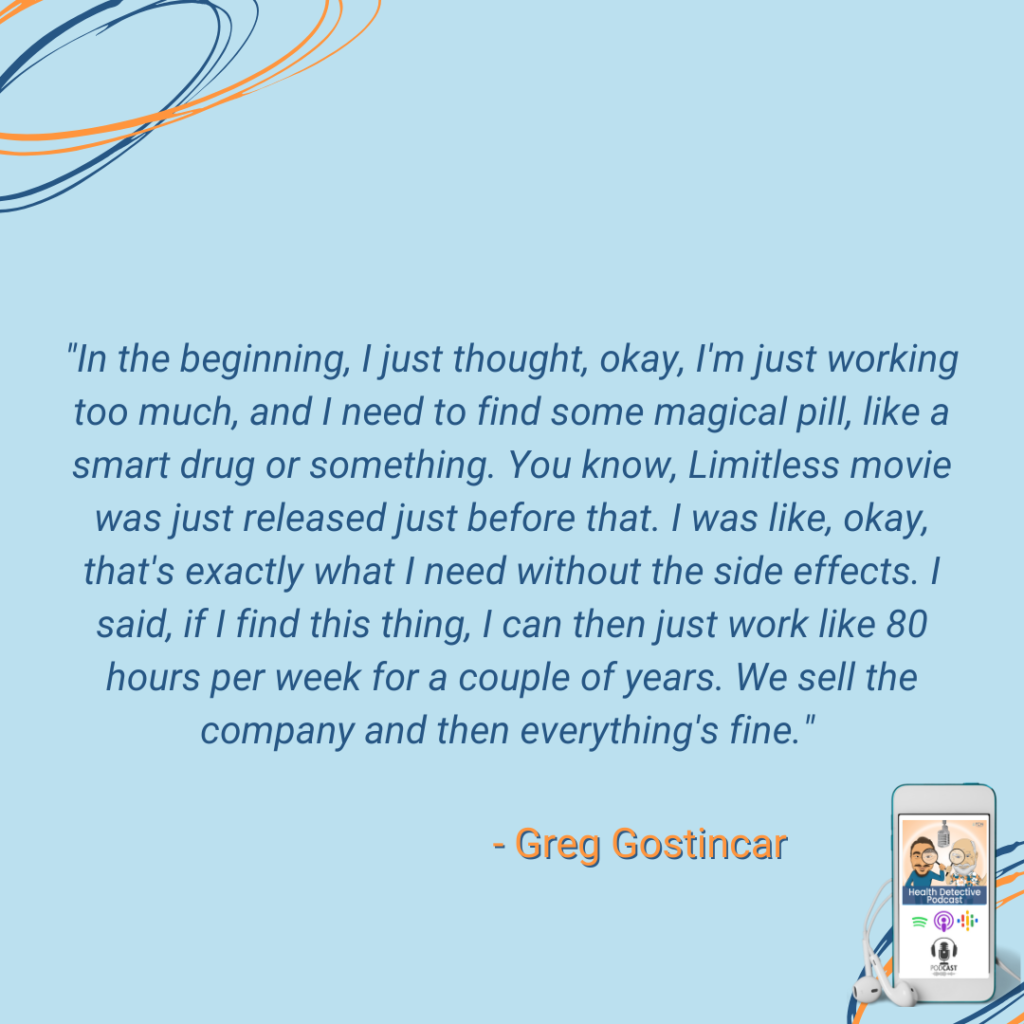
In the beginning, I just thought, okay, I’m just working too much, and I need to find some magical pill, like a smart drug or something. You know, Limitless movie was just released just before that. I was like, okay, that’s exactly what I need without the side effects. I said, if I find this thing, I can then just work like 80 hours per week for a couple of years. We sell the company and then everything’s fine. Well, obviously it didn’t go that well, so, yeah.
[00:06:01] Detective Ev: Then I think what’s interesting as you talked about the second time being a little harder and hey, this is a little more severe this time, despite doing a lot of the right things. I found that to be a common trend in this community. Maybe not even just with the burnout, but with their disease state. You know, they were living this crazy life before. We call it the SAD lifestyle, standard American diet and stuff.
Crashing Is Easier the Next Time
I’m sure in most of Europe, it’s not significantly better. But the USA, man, we’ve really pushed it with a lot of the stuff that we’re doing health wise. Even the fast food I know has different ingredients from here to a lot of places in Europe, it’s kind of disgusting.
So, what happens to these people is they were actually living a very standard American lifestyle for a while. They finally get those health issues, or they can’t push any more. They change that stuff around and then they try to get back into it to some degree. And yeah, that second times harder.
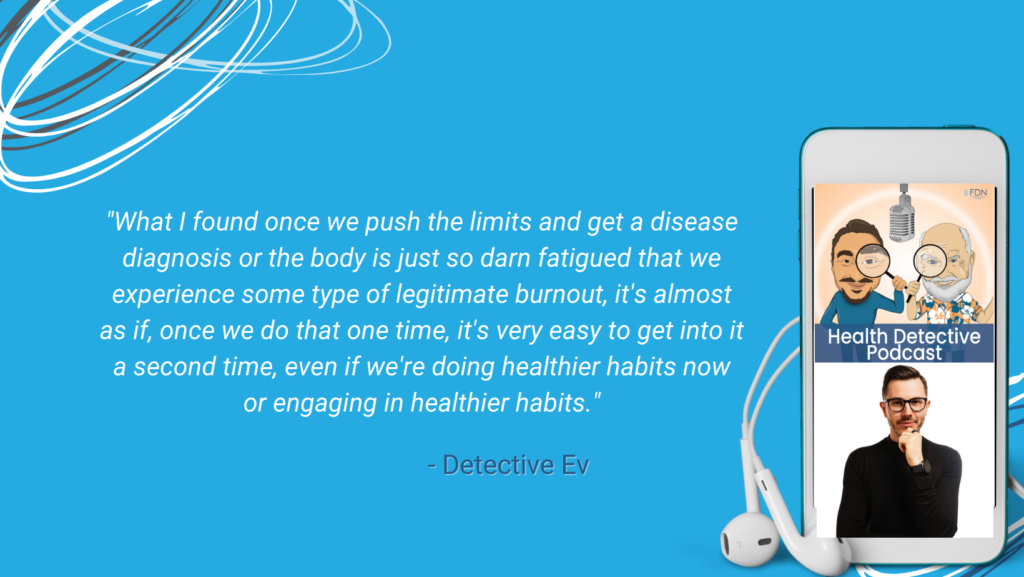
What I found once we push the limits and get a disease diagnosis or the body is just so darn fatigued that we experience some type of legitimate burnout, it’s almost as if, once we do that one time, it’s very easy to get into it a second time, even if we’re doing healthier habits now or engaging in healthier habits.
So, after the second time, you said you needed almost a month to kind of get recovered. What were some of the new strategies that you were starting to put in? Is that when you were kind of, I know you mentioned the Limitless movie, which I’m not a huge movie guy. I have seen that and that was something where that totally caught me, man. I was like, I wish I could do this. I definitely think we have similar personalities in that sense.
So, what were you looking into after that second time? Were you starting to try to find those maybe smart drugs or whatever you’d want to call them, nootropics, to try to get things a little more under control?
Thinking About Alternative Ways to Achieve Peak Brain Performance
[00:07:34] Greg Gostincar: Actually, that was the first time. The first time when it happened, I was like, okay, I want to work. I want to continue working the way I do, because there’s just no other way to do it. That’s what I thought back then.
I just started searching for nootropics, smart drugs, et cetera. I was like, okay, I need this thing. I need to find it. I’ll take it for a while. I will do what I need to do, then it’s going to get better. Obviously, it didn’t work that well. But then the second time, I already knew like, there are no shortcuts to better health, to getting out of that.
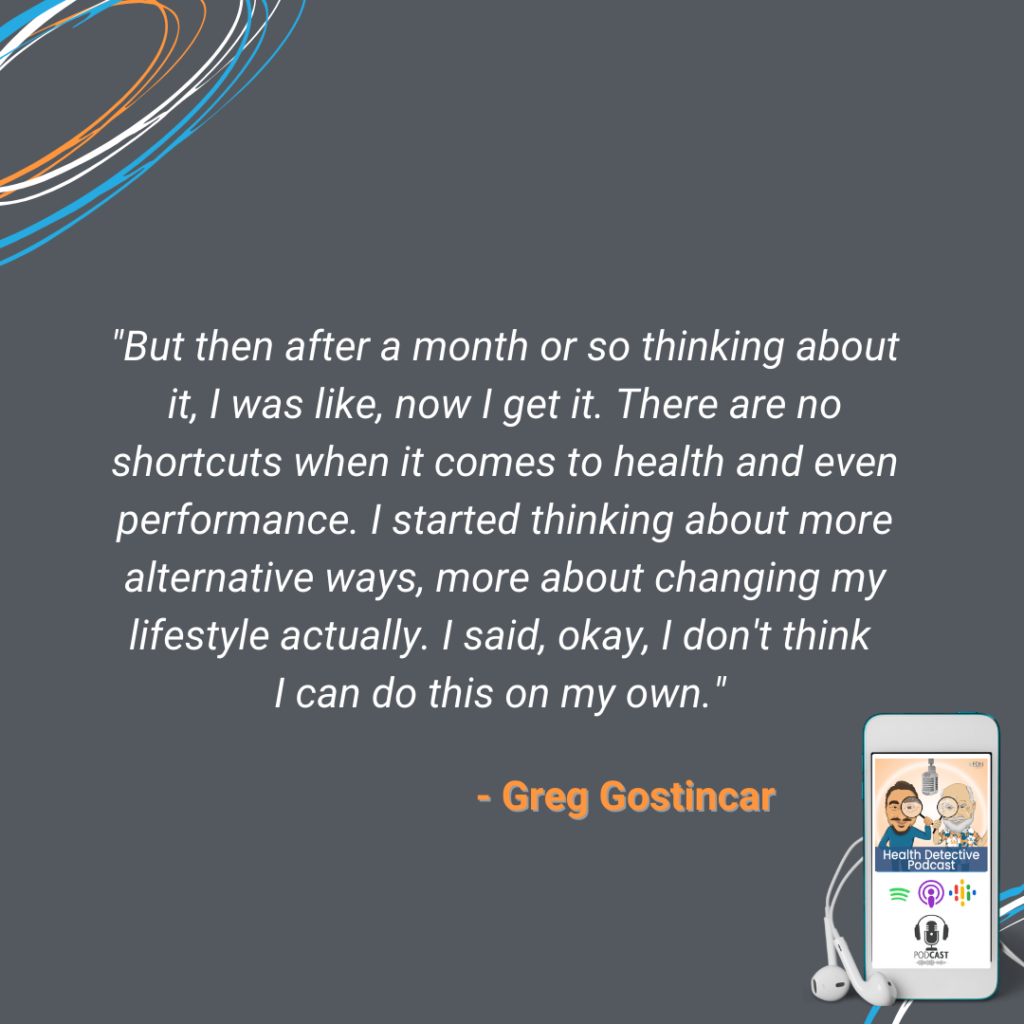
When it happened, actually, at the first moment, I was like, why is this happening again? But then after a month or so thinking about it, I was like, now I get it. There are no shortcuts when it comes to health and even performance. I started thinking about more alternative ways, more about changing my lifestyle actually. I said, okay, I don’t think I can do this on my own.
In the meantime, learned a lot about nutrition and sleep and different things related to brain performance and so on. But at that moment, I was like, okay, I need to find some professionals that are going to guide me. The main issue that I had was, like you mentioned, once it happens a second time, it can happen the third time much faster, I think.
What I started thinking about was, I need someone to tell me when it’s time to stop. Because my idea was obviously learning, listening to a lot of motivational speakers and successful businessmen from the U.S. and worldwide.
Getting Bad Advice Before Achieving Peak Brain Performance
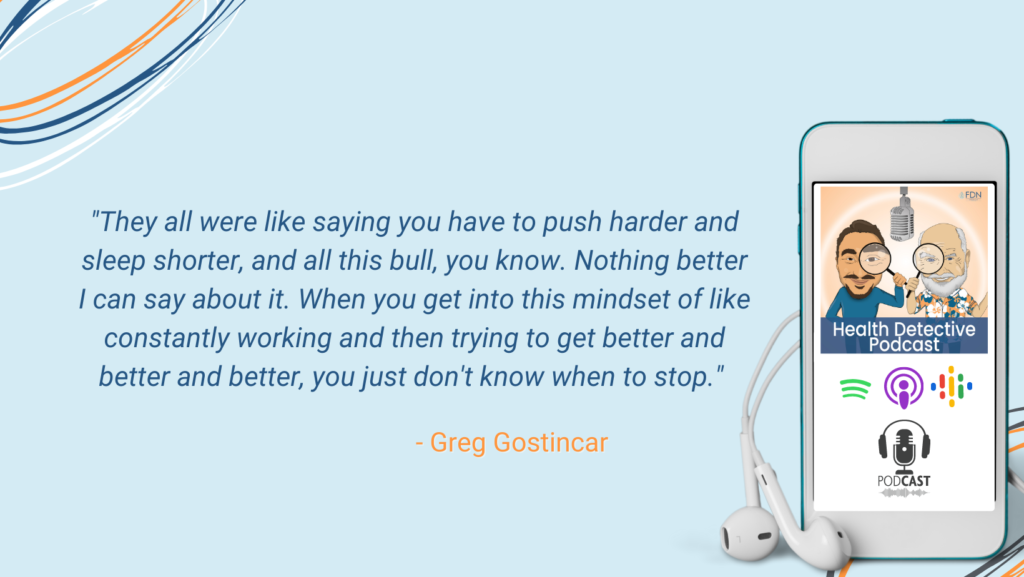
They all were like saying you have to push harder and sleep shorter, and all this bull, you know. Nothing better I can say about it. When you get into this mindset of like constantly working and then trying to get better and better and better, you just don’t know when to stop.
That was my exact experience. I had no idea, like if I’m working eight hours per day, is this too much? Is it too little? When I got tired, I just drank a cup of coffee and then another cup of coffee. Then all of a sudden, I was drinking like four cups of coffee per day, plus taking the supplements, plus all other stuff, but it was just too much for the body and for the brain.
That’s when I decided to search for some experts who are going to guide me here on this way in a special dynamic, and now it’s time to stop. It’s fine if you stop. You need to take days off to recover. Think about professional athletes and so on.
So yeah, that’s what happened the second time.
[00:09:40] Detective Ev: Just, even based on your story, you seem like relatively young. Are you under 40?
[00:09:44] Greg Gostincar: Yeah. I’m 30 years old.
[00:09:45] Detective Ev: Oh, okay. Yeah, I figured. We’re pretty close. I’m almost 27 and here’s the thing. We actually have, I’m being serious, very similar personalities based on what you’re saying.
Constantly Shooting for More Before Achieving Peak Brain Performance
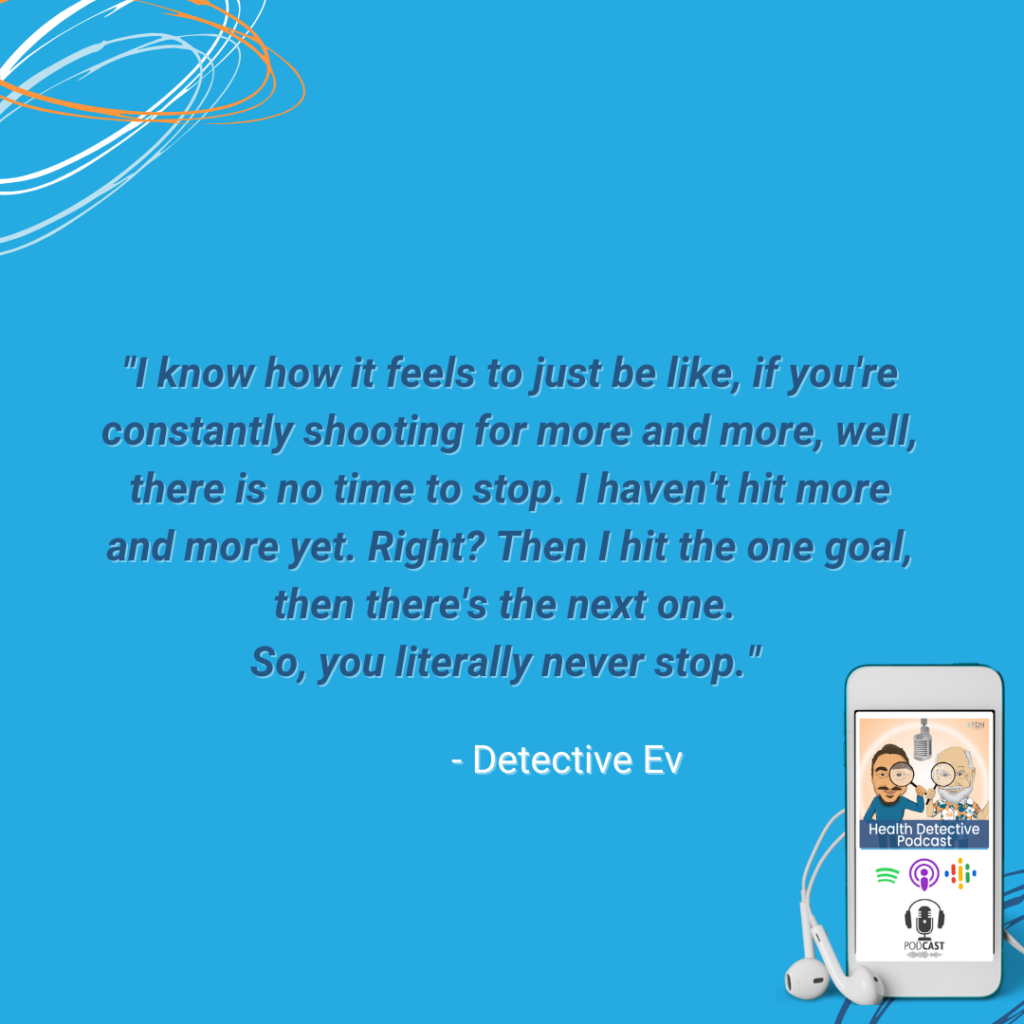
I know how it feels to just be like, if you’re constantly shooting for more and more, well, there is no time to stop. I haven’t hit more and more yet. Right? Then I hit the one goal, then there’s the next one. So, you literally never stop. Because I’m either being productive towards those never-ending goals that I want, or I’m not, it’s very objective.
Then every time I’m not being productive, I feel guilty about this. Oh my God, why am I not working hard or whatever? And you’re right, there’s a huge narrative that’s pushed by like these 50, 60, 70-year-old moguls that really did (I don’t think they’re lying), they really did get to where they’re at largely in part because of their work ethic.
Now here’s the problem though, and this is something that I’m seeing in the modern world. I think we’re seeing less and less of that push. I’m not saying it’s not existent, but we’re seeing less and less of that push work. I mean, certainly it never works for someone for more than 10 years, but it usually doesn’t even work for a couple of years.
The question is, well, why is that? How did these guys do this or even some women do this at that time? Yet the men and women today, we can’t do that. I think what’s happening, first of all, we are their kids, right? So, we’re that next generation that you can only beat up a human body for so long before the next generation starts feeling it.
Living In an Unsustainable Lifestyle for Peak Brain Performance
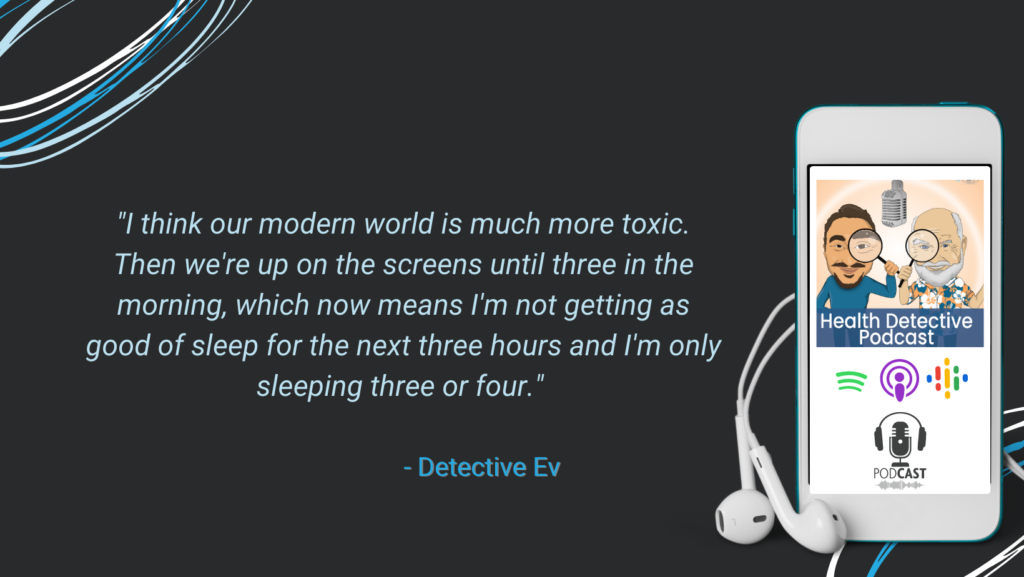
I think our modern world is much more toxic. Then we’re up on the screens until three in the morning, which now means I’m not getting as good of sleep for the next three hours and I’m only sleeping three or four. I wake up at six or seven and I’m back on to the next thing. I think there’s more hits to our body and brain. It makes it very obvious that those types of hours are just not sustainable.
You know what’s cool in today’s world? Listen, if you want to be the top of the top, first of all, you gotta be highly intelligent, little bit of luck probably, and you gotta work your butt off. Someone like Elon Musk, I know he’s a controversial figure, I’m not getting into that. Objectively, this guy’s measured IQ, super high, and he works a hundred hours a week. If you want to be that that might be the case.
But if you want to be financially successful and leave a legacy for your family or have some stability, you and I both know no one might ever know your name and you can still figure that out in today’s world, thankfully, without ever having to work the 16, 17-hour days.
Before we get into that, because I think that’s going to be useful for a lot of our people that listen, I’m curious. What were some of the main things that helped you? You kept saying that you went to these professionals, and you learned when to stop. What were the biggest things that really helped get yourself under control and realize you don’t need to go out and do this, or I can rest? I’m just curious, like what some of the steps were.
Having a Mindset Problem That Blocks Peak Brain Performance
[00:12:07] Greg Gostincar: Well, honestly, I tried a lot of things, but the biggest impact on my health back then was psychotherapy. I found different experts actually. Then I started working with one for a while. We had lots of sessions together talking about it, you know? I think that at the end, biggest impact. In this process, I tried psychedelics as well with the psychotherapist present. That was really helpful. So, we sped up the process a bit. But yeah, I think that had the biggest impact.
Because like you mentioned before, you’re always trying to achieve something that you will never achieve. And you just keep on pushing. If it’s like 8:00 PM and you’ve been working for like 12 hours, has to have some energy, you’re like, okay, maybe I finish just one more task today. Then you never stop.
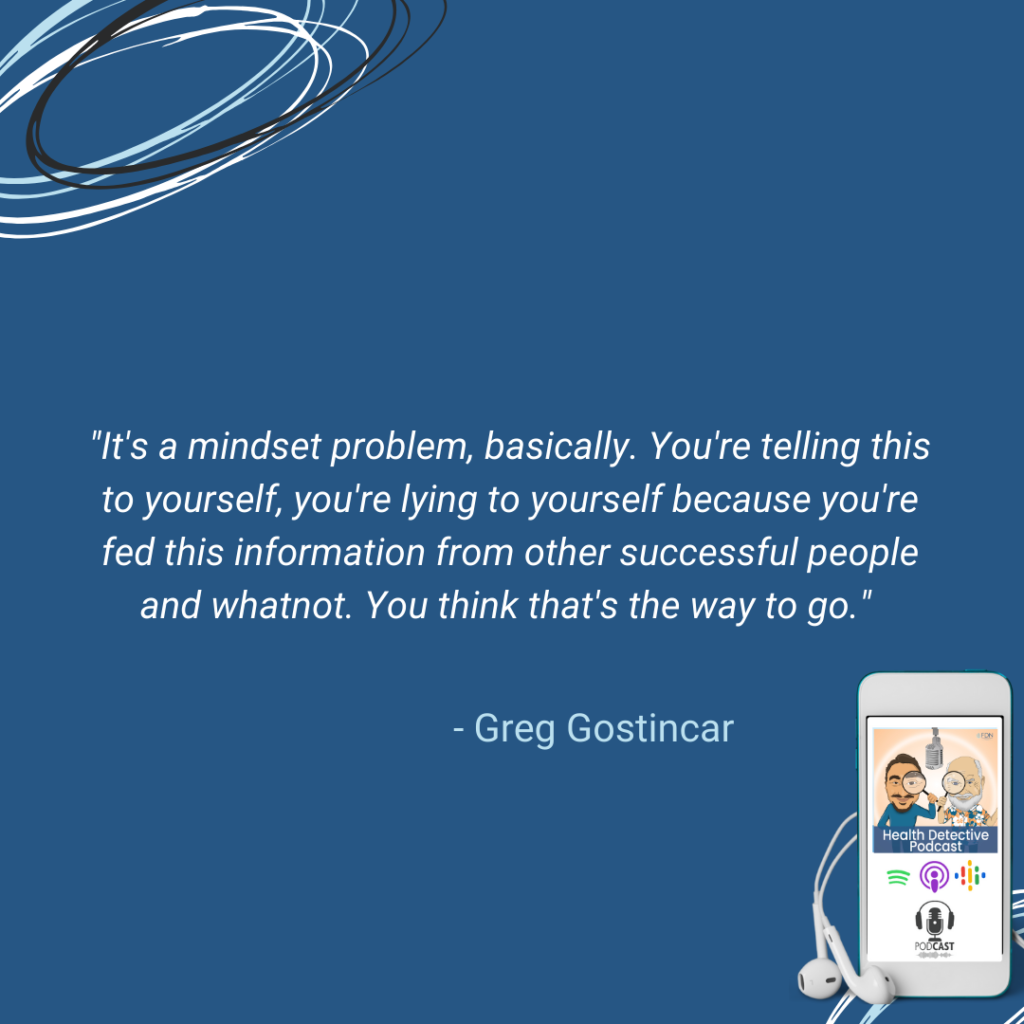
But I think this is mainly in your mind. It’s a mindset problem, basically. You’re telling this to yourself, you’re lying to yourself because you’re fed this information from other successful people and whatnot. You think that’s the way to go.
Now, I’m not saying they didn’t do that, like you said before. But at the same time, when I’m telling the story, what happened to me, I also think I exaggerate a bit more. I think if I’m really honest with myself I don’t think I’m a hundred percent. I try to be a hundred percent honest, but I guess we all exaggerate a bit more. It’s a bit.
So, I think when someone is saying I was working like hundred hours per week, yeah, maybe. But maybe it was like 80 hours and this 20 hours per week makes a big difference if you’re sleeping those many hours.
Understanding I’m Just a Human to Reach Peak Brain Performance
[00:13:25] Detective Ev: Especially sleep wise. Yes, absolutely. That is like two and a half full nights of sleep.
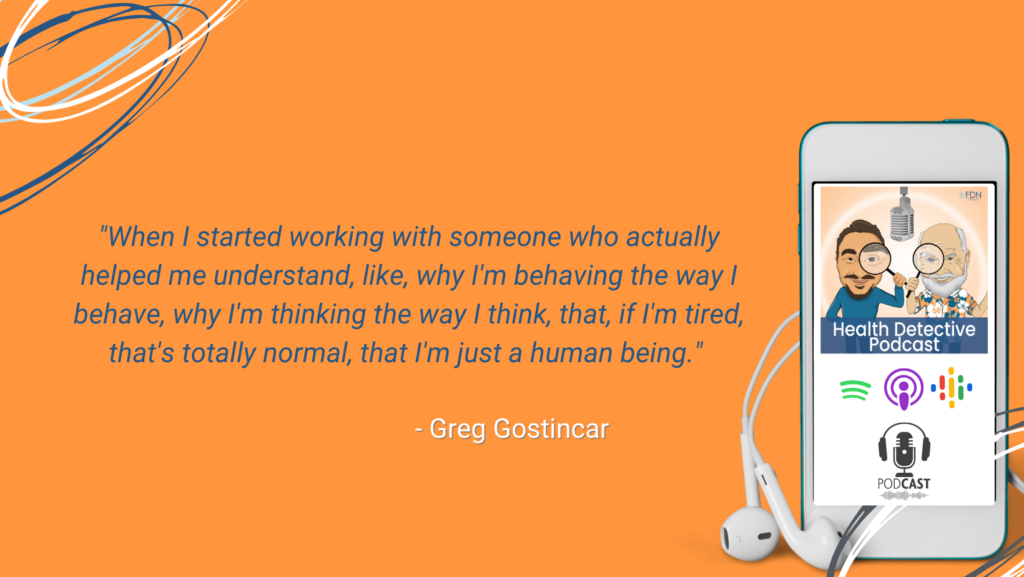
[00:13:30] Greg Gostincar: Exactly. So, yeah getting back to your question. When I started working with someone who actually helped me understand, like, why I’m behaving the way I behave, why I’m thinking the way I think, that, if I’m tired, that’s totally normal, that I’m just a human being.
That was really mind blowing and had really massive impact.
[00:13:47] Detective Ev: I appreciate you sharing that, especially with the psychotherapist. That’s kind of cool. You said this is a mindset problem. I, 100000% agree with that. I know, again, there’s many, many women who get into this, like hyper competitive, 80 hours a week type of thing, or aspiring to the 80 hours. Who knows if we’re actually all doing it?
But I do think for us males, we’re a little more prone to something like that because of just our competitive nature. Right? Testosterone, right? It’s like that kind of thing. I think what you said about the mindset resonates so much with me because I started asking, okay, I’m killing myself to do this. What is this for?
Do I actually care about a hundred billion dollars? I’m not saying I would decline it if someone sent it my way, but am I willing to sacrifice my entire existence on the chance that I might get this? I realized actually, no, I don’t really care about that at all. I like earning money, but the truth is, I’m just not a spender. I don’t have crazy, nice things.
Doing the Mindset Work to Figure Out Who We Really Are
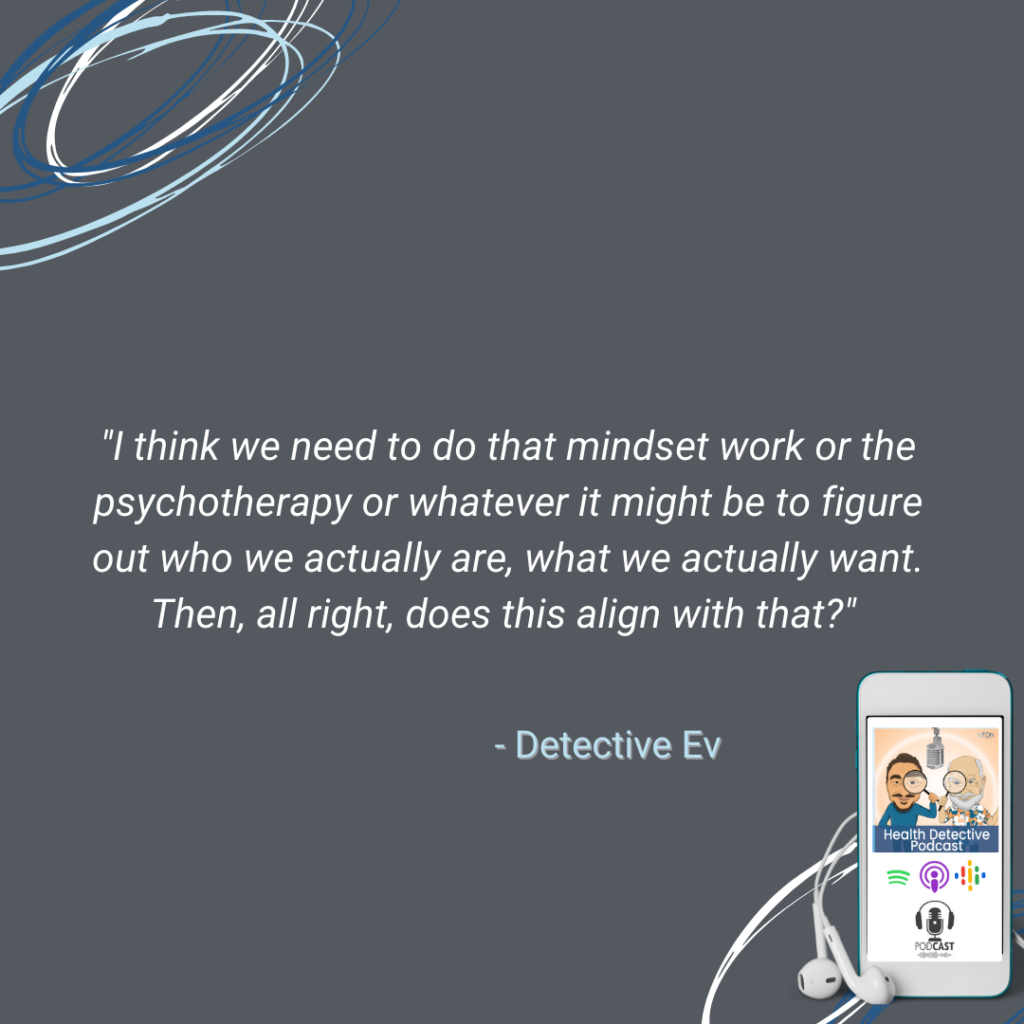
I like experiences, but that’s about it. I started understanding that’s not even Evan, that’s not even what I want. Yet I’m putting all of my energy into this. So, I think we need to do that mindset work or the psychotherapy or whatever it might be to figure out who we actually are, what we actually want. Then, all right, does this align with that?
The truth is it, it might not. Again, thankfully in today’s world, if your goal really is just stability, financial freedom, all that type of stuff, I think that’s a lot more achievable than people realize. It’s certainly more achievable than it was 50 years ago. The internet has been a very great mediator for many people. World’s not perfect yet, but I think it’s really leveled the playing field for quite a few individuals. I think that’s kind of amazing.
So, you did the psychotherapy thing and I appreciate you actually mentioning that as being your number one thing. But I know that this eventually moved into like you helping other people like kind of perform at their best peak performance. I think, again, this is going to be something that a lot of the practitioners or future practitioners that listen to this show, their ears perk up when they hear something like that. Because they’re like, wait, yeah. How can I get to the peak performance?
I don’t even know where you want to start with that. Actually, I have a question then. How did you decide that you wanted to do that? Because you had these other entrepreneurial endeavors, you could have just applied it to yourself and continued those. But instead, you decided to focus on other people and helping them. How did you make that transition to that?
Living More in the Present to Foster Peak Brain Performance
[00:16:04] Greg Gostincar: That’s a great question. Well, the thing is when I was in the situation, or when I got out of it, I started looking around, I became more present. Of course, mindfulness was the other thing that helped me, meditation and so on. But we can talk about it later on.
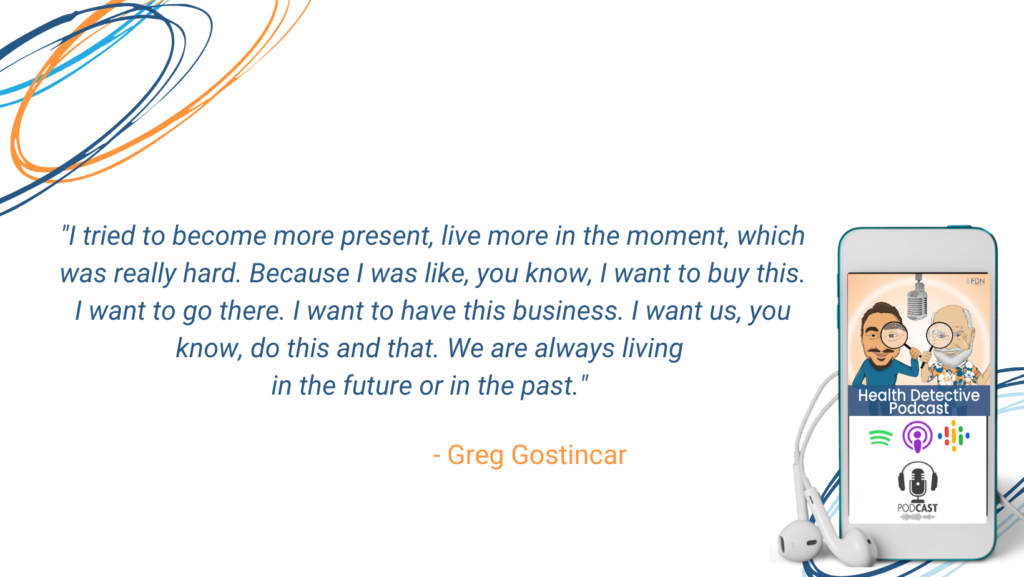
I tried to become more present, live more in the moment, which was really hard. Because I was like, you know, I want to buy this. I want to go there. I want to have this business. I want us, you know, do this and that. We are always living in the future or in the past. So it was like really hard to try to be a bit more present and be more focused.
But when I managed to do that, at least for a while, I started figuring out like, you know, what’s going on around me. You know, what my friends are experiencing is exactly the same. I saw the exact same symptoms in my friends, in my coworkers, and in the company I worked for, where I built it and started up basically.
I was like, okay, this is a massive problem. It’s not just me, everyone around me, or almost everyone. Eventually, I started thinking, if I had this experience at my age of 23, that happened the first time. Maybe, you know, I was quite fast. I launched the first startup quite quickly.
Wanting to Help Others Reach Peak Brain Performance
I did my master’s at 23, so that was quite fast, but something normal for the area where I live or for the whole European. But I said, okay, eventually those people will do this, and they will experience exactly the same problems. But are they aware of that? Was it just me? Was I totally blind to what’s going on or is everyone else like that?
Then when I started noticing those issues and I started talking to many entrepreneurs (for example, we were searching for investors back then, so I talked to like hundreds of investors.), when we did some small talk, they all said the same thing. You know, like we were so tired and blah, blah, blah. You know, there’s so many things I mentioned. They were under so much stress and so on.

I was like, okay, so this is a big pandemic, like a real pandemic. This is like a big thing. Is there anything I can do? Something that I learned? Is there anything I can share with others? At least help some people try to prevent it, or warn some people, if you continue doing this and that, this might happen. That was in my mind. That’s what got me into performance and peak performance and so on.
[00:17:59] Detective Ev: Okay. Cool. I love that. You seem to just have like a really sharp mind, like that future thinking, to realize, okay, wait a second. This happened to me, it’s probably going to happen to them, and they might not even realize it yet. So, I’m going to be prepared for it. It’s pretty impressive to be able to put your mind out there like that and get ready for it.
Helping Others Improve and Reach Peak Brain Performance
So, you became, it said in your bio, a health professional, like in brain type of stuff. What does that even mean to be certified in that? Like where did you get that certification? That’s interesting to me.
[00:18:25] Greg Gostincar: Yeah. I’m a certified brain health professional, and I did this at Dr. Amen University. Dr. Amen is, I think, the world’s most well-known psychiatrist in the U.S., a legend actually. He has different programs available. I did one of those, the main one, basically, for brain health.
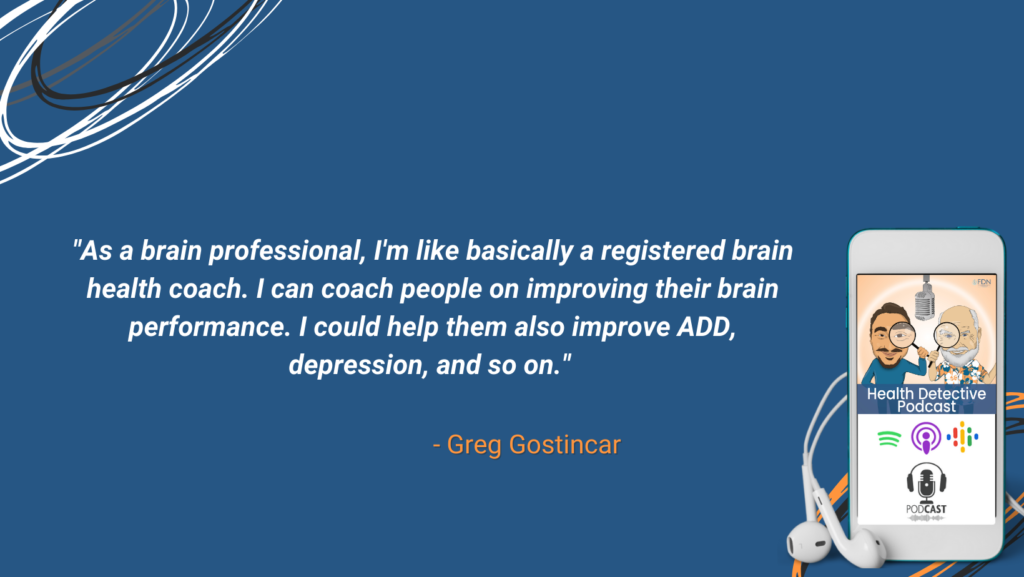
As a brain professional, I’m like basically a registered brain health coach. I can coach people on improving their brain performance. I could help them also improve ADD, depression, and so on. But I don’t feel like I have enough know-how about that, so I don’t want to go into that.
That’s why I stayed in this peak performance area. I mean, I have a team of experts. I have two psychologists employed, a nutritionist. I work with neuroscientists and a biochemist for the supplement part. But yeah, in terms of coaching, I only work on the peak performance part.
Commercial Break – Get Your Questions Answered
[00:19:08] Detective Ev: I like the sound of that brain health coaching thing. I feel like that’s right up my alley. And just so you guys know whether it’s something like that or the FDN program, you actually can do these things around the world. We have practitioners in over 50 countries around the world now, as FDNs.
It does look a little different depending on where you’re at and it could even look a little different depending on which town you’re in or city you’re in. Sometimes the country might be a yes, can we do FDN there? But then the question might be, well, what does your specific town look like? What would it look like getting the labs in and out?

What you’re going to want to do, if you are interested in becoming an FDN is go to fdntraining.com/call. What this will do is take you to a page where you can book in with one of our course advisors and they’ll get your questions answered. They can figure this out if it’ll work in your specific town. I would assume most likely, depending on where you’re from, you might have to wait like one or two business days, give them your information and then we’ll get it sorted out.
But if you’re interested in this, that would be the place to go. So that’s, fdntraining.com/call.
Okay. Now back to the interview.
Helping Students & Professionals Achieve Peak Brain Performance
Very cool. I always like for the people that come on here to kind of be able to just more or less breakdown, I kind of already have an idea, but it helps to say it directly. Who is the ideal person then that comes to someone like you? Like, what do they look like? Is there a certain pattern in careers? I know they’re probably working or aspiring to work those 80, 90-hour weeks. But outside of that, like what are some similarities you’re seeing in the people that you like to take on and help?
[00:20:38] Greg Gostincar: We have different groups of people. Obviously one group are students. They’re mainly searching for their short cuts. That’s why it’s really hard to help them. Cause they say, like, give me like top three hacks, give me top three supplements, tell me something that I can pass the exams and I can do what I have to do.
That’s one group who, I think, most of them are not searching for holistic approach to peak performance, but mainly like shortcuts. I’m pretty sure you know many of those that are doing that.
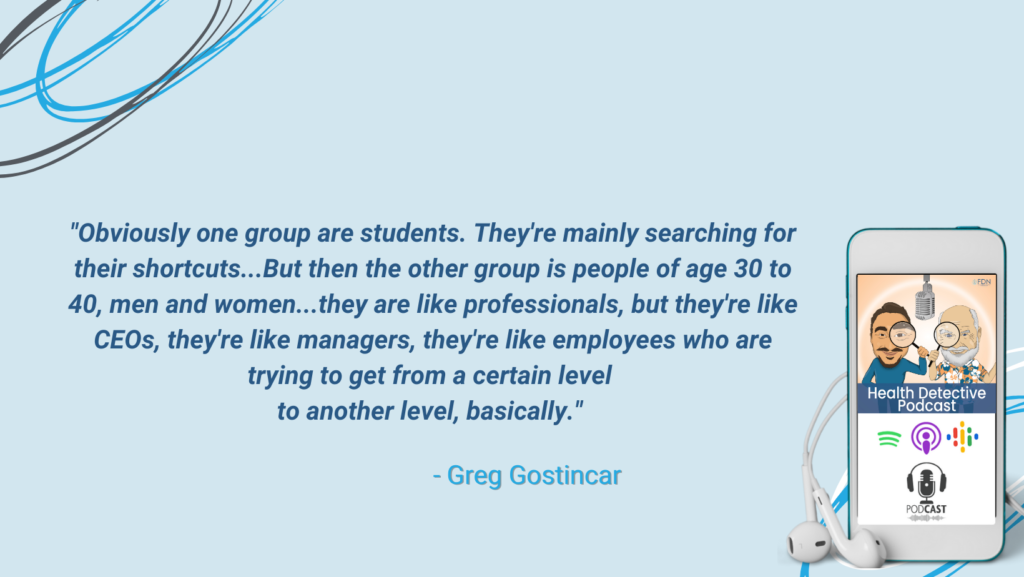
But then the other group is people of age 30 to 40, men and women, obviously. As we said, they are like professionals, but they’re like CEOs, they’re like managers, they’re like employees who are trying to get from a certain level to another level, basically. They try to get a better job or if they’re leading a company, they want to be more successful either financially or otherwise. They are those people that push too much.
Figuring Out the Hinderances to Peak Brain Performance
What I immediately see is either they come to me, and they’ll say, hey I have issues with focus. I’m like, okay, tell me how much you sleep and what you eat. They’re like, hey, na, just give me, you know, that’s like not the problem. I sleep enough. I sleep like five hours per night. I’m like, no, you don’t sleep enough. Let’s fix this first.

They’re often like they don’t asleep long enough or have issues with anxiety, stress. They don’t know how to control stress. It’s immediately, usually after one, two questions, I know immediately, what’s going on. I don’t know the cause of it, obviously. It takes a bit longer to find out, but I kind of recognize the same patterns there.
Some that reach out to me or to my team, they search for a holistic approach. They’re like, okay, tell me what’s wrong. Why is this wrong with me? And what can I do about it? But some still search mainly for the shortcuts, for the pills, brain pills, or like nootropics and supplements.
But we somehow manage like most of them, we try to convince them that once we find the cause it’s usually like supplements, ones really help them or not as much as they think. So, we don’t just coach them or help them, but we also have to kind of teach them and explain to them why something happened.
Quite often we change one or two things. We recommend change, monitor things, and immediately see some amazing benefits.
Opening Up to Lifestyle Changes for Peak Brain Performance
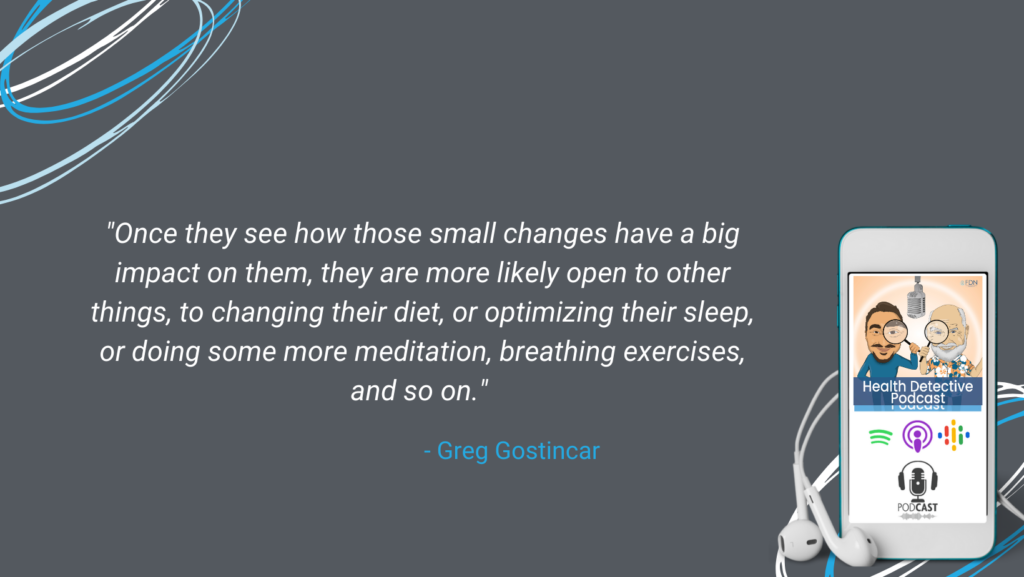
Like, if you go outside in the morning to expose yourself to some sunlight, your nervous system wakes up. That’s how our body works. Once they see how those small changes have a big impact on them, they are more likely open to other things, to changing their diet, or optimizing their sleep, or doing some more meditation, breathing exercises and so on.
[00:22:59] Detective Ev: I like that approach too. I think it’s always good to give people, if we can, this stuff in the beginning that has the most immediate impact and results for them. And anyone that listens regularly knows I’m totally into the light stuff. It’s a huge passion of mine. So, I love that you brought up that morning light thing.
Because, well, almost every time from what I’ve seen within the first seven days, the people that I’ve worked with are very aware that they’re doing something positive. They can already see it in their sleep. For those that want to try that, my rule is just, 30 minutes, bare eyes, right at the time of sunrise. Give that a shot.
I have found very few that don’t notice an effect from that in seven days. I have never had someone that did not notice it within 30 days. It’s pretty cool. I mean, that’s a lot quicker than most things, guys. It’s a lot quicker than half the medications out there nowadays. You know, an SSRI, we got to wait three weeks for that to really kick in. So that could be a good thing to try for people. I mean, it’s not going to hurt you to stand out around sunrise time. I don’t think that’s ever hurt anyone.
Finding the Quick Wins to Encourage Peak Brain Performance
So, when these people are coming to you and they’re wanting to achieve these kind of new levels of performance or just optimize, are you finding then that just like you were, it was mostly mindset stuff? Are you finding that you’re spending a lot of time on that mindset with them before you get into anything else? Cause that’s how it kind of sounds. You almost need to get them out of this mindset that they can’t sleep only five hours a night or they got to actually take care of themselves. Is it mostly mindset work in the initial stages?
[00:24:18] Greg Gostincar: Not really, actually. I mean that will be the best way to go about it, I think. But when someone reaches out to you and say, hey, I have issues with focus, what should I do? If I tell them like, you have to change your mindset. They’re like, you know what, whatever. I’ll just go to someone else.

That’s what I experienced in the beginning. Then we changed basically our approach. We said, okay, you have issues with focus. We have this amazing assessment that we developed. Let’s go for the assessment. There’s a questionnaire, we do this short interview to find out about their lifestyle, et cetera. Then we try to find what’s going on in your brain, and so on.
Then if we find what’s happening, we say, okay, if you want to boost your focus, you can try this, this and this. Like short wins that are simple to implement. You don’t have to pay for them basically, they’re super easy, like going outside in the morning. Well, it’s a breeze for some than it is for others, but still.
Sharing Some Tips to Peak Brain Performance
Once they see something beneficial is happening, then we start talking about the mindset. I think from my experience, it’s better than the other way around or at least that’s how we did it. That’s how we get to where we want to get.
[00:25:18] Detective Ev: Okay. I’m not asking you to give away your secret sauce by any means, and I know everyone’s going to be different regardless, but just because I know some people are obviously clicking on this podcast solely to hear maybe some steps that they can walk away with, we did talk about the morning light thing. I’ve said that a million times on here and I stand by that.
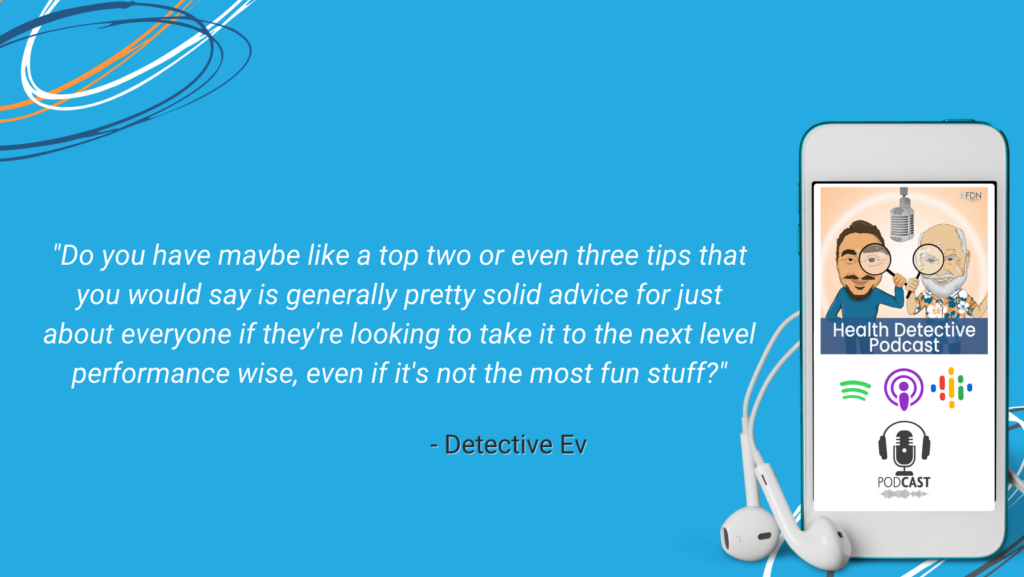
Do you have like a top two or even three tips that you would say is generally pretty solid advice for just about everyone if they’re looking to take it to the next level performance wise, even if it’s not the most fun stuff? What are your top three things that if I could get everyone to do that, I would get them to do these three things?
[00:25:53] Greg Gostincar: Yep. The first one is obviously using the morning light, going outside. Or I have one light here, and another one here. Maybe you can see. I have two super bright lights here that stimulate your eyes. Whenever I can’t go outside, I just use those lights in the morning, whenever I’m working. Like super cheap lights, cost, like 20, 30 bucks. They do the work for you.
Was talking about light, so, expose yourself to bright light in the morning and then avoiding bright light in the evening. Not just the blue light that everyone is talking about but actually the bright light is the big problem, you know?
Taking Supplements for Peak Brain Performance
From like 9:00 PM, till you go to bed, you should avoid all bright light. Because just like two-second exposure to super bright light in the evening, after 10:00 PM, it’s just going to suppress melatonin production and you’re going to have issues with sleep.
I use Oura Ring for tracking, we use more advanced gadgets as well. But we’ve noticed this two seconds of light and you’re done. Like you will still sleep long enough probably and you may recover during the night, but you need to sleep longer and you may have issues with falling asleep. So that’s the simple one and it’s basically free.
The second one is. Well, I’m a big fan of certain supplements and nootropics, I think they’re crucial. Not like spending 200 bucks per month for 20 plus supplements that many people do and then take all those capsules in the morning. That’s not what I recommend. But there are a couple of compounds that I think everyone should take.
Like omega 3, B12, Vitamin D3 plus K2, and a few nootropics like choline, which is crucial for neurofunction. Phosphatidylserine is great and some adaptogens like Rhodiola Rosea and Bacopa Monnieri. We have those different pre-made stacks available.

I think everyone who’s trying to achieve peak brain performance should go start taking those supplements mainly because you need them for peak performance, if you are under severe stress. Those deplete quite quickly. Like, you need more L-Tyrosine, for example, and so on. B-vitamins deplete quite quickly so you need to supplement them. This has like a massive impact on your performance. It really helps your body to kind of stay balanced, even under severe stress, or if you have lots of work to do.
Optimizing the Diet for Peak Brain Performance
There are many bio-hacks, like I could count 20, 30 plus that I try to implement into my routine from meditation, breathing exercise, and so on. But I think the one that had the biggest impact on me, which is not really a bio hack, but it’s just changing your diet.
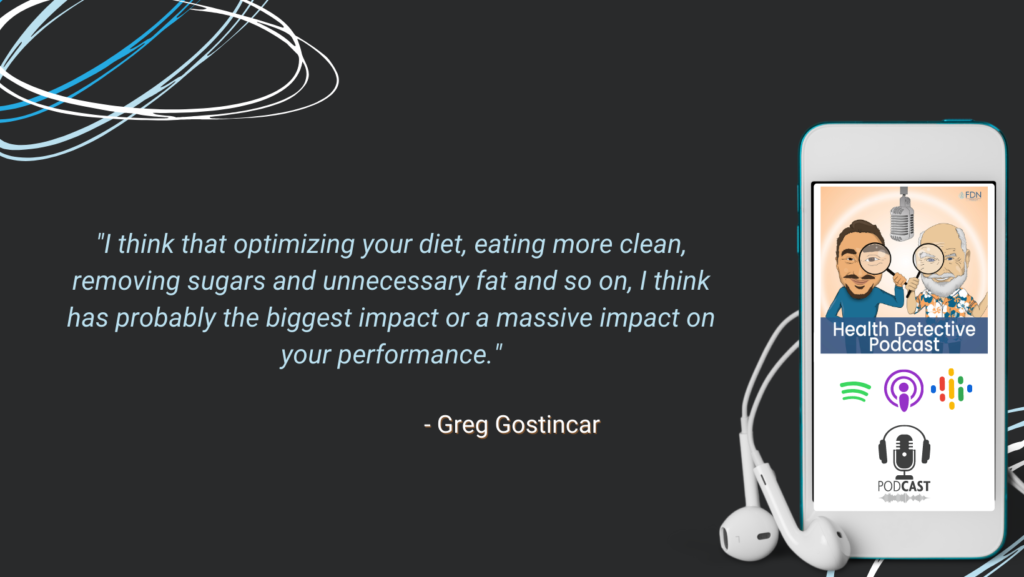
There are many ways you can eat. I don’t wanna go into different diets and that’s not important, but as soon as you cut the crap out, then lots of things change. I think that optimizing your diet, eating more clean, removing sugars and unnecessary fat and so on, I think has probably the biggest impact or a massive impact on your performance.
There are many different hacks, like eating high carb dinner, basically, which is crucial for better sleep. They need to go high protein breakfast, which will give you the energy without the crash. It’s going to keep your blood sugar stable and so on.
There are many small hacks that make your life even easier. You know, you have more energy and so on. But those four things, I think, like I would recommend to everyone. You don’t have to spend much money on that. It’s very simple to do that that, has a massive impact.
[00:28:48] Detective Ev: Cool. Well, thank you. That’s a lot of stuff. I love that you mentioned the blocking the light at night as well. This is not like a 1% or 2% difference, guys. I keep trying to say this to people and I don’t know why I can’t get people on board with it. I do all that stuff. It’s very serious for me.
Blocking Light at Night Encourages Peak Brain Performance

I actually wear special glasses and also filter my screens and use special lights in the room after sunset. So, for me at certain times during the year, that’s as early as 4:45 in the evening at that point, and that sun is set. I will block that light and lower the brightness and do all that stuff for several hours and then really try to get no exposure in time before bed. That’s made a huge difference for me.
It’s funny because people consider me like this high energy person and they ask like, how do you do that? I really do think that’s one of the biggest things. Because I even see this in the functional health community. For some reason, they’re amazing at doing the diet stuff. You could give them the craziest diet in the world, and they’ll go do it. They’ll take all the supplements, do all the diet stuff. I say, can you sit out in the sun for 30 minutes in the morning? Can you try to get out a little bit during the day? Then can you be a little more careful about blocking the light at night?
They’ll never do it. They just, oh, nope. Not going to do that. That one, I cannot understand because I think it has some of the most bang for your buck.
My dad is the perfect example of this, his name’s Greg as well. My dad has worked as a landscaper for over 30 years. This guy has been outside six or seven days a week that entire time. He is so dark because of the sun exposure. I mean, we don’t even look related in that sense. He looks like he’s from like South America. It’s kind of crazy.
Getting Great Benefits with Natural Light Exposure
Now, my dad though has never really been interested in health. This is a guy that smokes two packs of cigarettes a day. Eats pretty much whatever he wants. Now I’m not recommending or advocating for any of those things. But what’s interesting is this is a guy in his mid-fifties that’s strong as can be, super active, able to do everything he wants to do, can go run a mile randomly, even though he’s not a runner. He can do pull-ups, all these different things. But the only thing he has done really right is the light stuff.
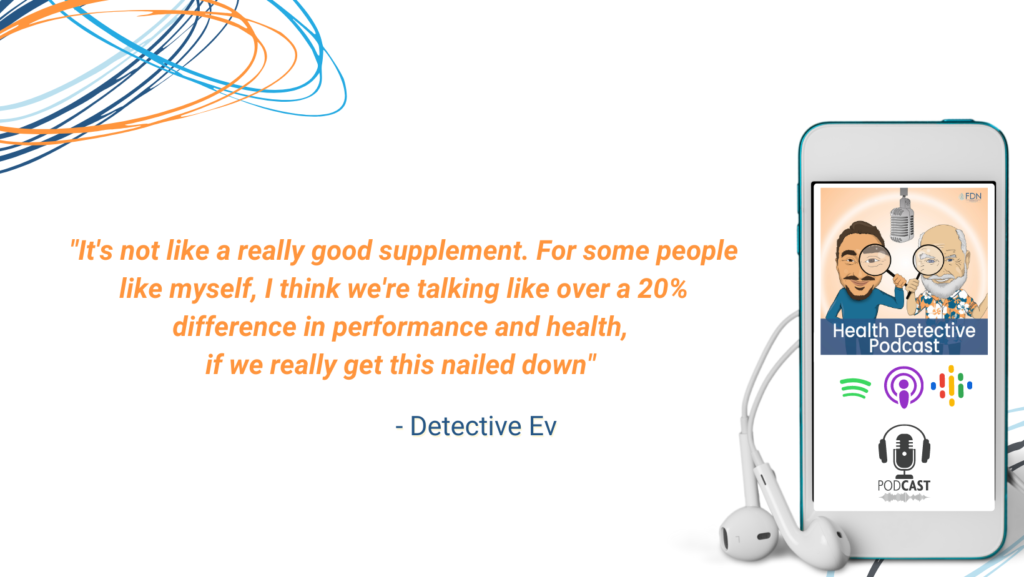
That’s pretty incredible because he’s outside all day, first thing in the morning until that sunset every single day. I don’t think this can be underplayed or overplayed enough that the light stuff, guys, is not a 1%, 2% marginal difference. It’s not like a really good supplement. For some people like myself, I think we’re talking like over a 20% difference in performance and health, if we really get this nailed down.
So, I appreciate that this is something that you’re doing with these high-performance types of people. I know the biggest problem for you is getting them to actually turn the screens off at night. Right? That would mean they have to stop working.
Blocking Blue Light and Bright Lights for Peak Brain Performance
[00:31:18] Greg Gostincar: Exactly. And then I was talking about blue light and like blue light blockers. I’m like yeah, cool. Like you have them. That’s perfect. I use as well; I have other other eyeglasses just for the afternoon.

But then I tell them, but you also have to dim your lights. They’re like, no, but it’s the blue light is the problem. Like, no, it’s not the blue light. It is a blue light, but it’s also the bright light. And bright light is actually the bigger problem of the two.
If you expose yourself just to blue light in the evening, like from your smartphone, that’s something. But if you have like super bright lights in your room, this is gonna suppress your melatonin production and other things. So, it’s an even bigger problem.
But the final thing is like you just said before, it’s such a simple hack and why can’t I get people to do it? Because it’s simple and it’s for free. If one of the famous or whatever biohacker says, there’s this gadget that cost like 500 bucks, and all it does, actually, it tells you to go outside for like 30 minutes. I know people are going to buy it and they’re going to do it actually.
If you tell them, it’s for free and it actually works and there’s a bunch of scientific studies confirming that, it will be like, is there something else that I can buy? Something more advanced, you know? And that’s the crazy part. So yeah, I have the same issue telling people to do that. But yeah, I’m finding ways to do it.
Getting Clarity on Brightness vs. Spectrum for Peak Brain Performance
[00:32:28] Detective Ev: I guess it depends on how we’re defining it, so I’m not going to get into a whole thing right now. I’m interested in the whole; the brightness is more important than the spectrum of light. I’m not challenging that, I just hadn’t seen that specifically, although it does kind of intuitively make sense.
Are you suggesting super bright light that’s purely red, maybe like 600 something nanometers in wavelength, you’re suggesting that that would be more detrimental to melatonin? Less bright, but let’s call it 500 nanometer wavelengths, kind of like a blue or green type of thing?
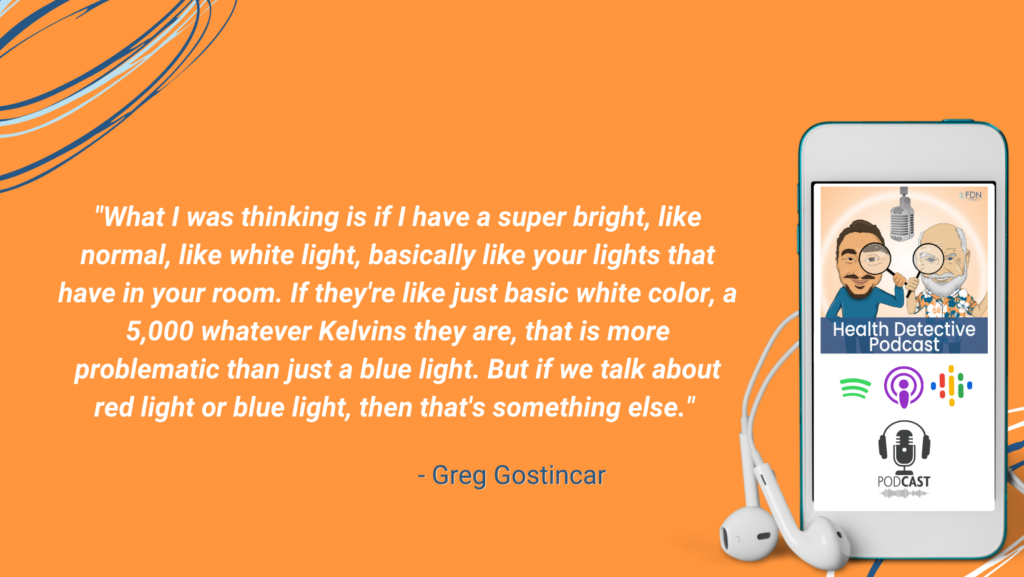
[00:32:59] Greg Gostincar: That’s hard to say. What I was thinking is if I have a super bright, like normal, like white light, basically like your lights that have in your room. If they’re like just basic white color, a 5,000 whatever Kelvins they are, that is more problematic than just a blue light. But if we talk about red light or blue light, then that’s something else. So yeah.
[00:33:20] Detective Ev: Oh, I appreciate the clarity because I was like, I mean, the light thing’s very complicated, and there is a lot to learn about that. So, I was curious. All right, that makes more sense. That is actually important for people to understand.
Because I got my nighttime blue blockers and I love them and they’re a really useful thing. I can put them under a spectrometer, and I know that they block 99% plus of the blue light and even into the green spectrum, which is important.
Sleeping Naturally in the Dark for Peak Brain Performance

But people don’t realize that at one point in our human history, we were outside in the dark. You know, maybe you had fire, but that was just like the red and near-infrared mostly. Most of the time you’re probably in the dark, especially once you’re in bed. I don’t think there’s a raging fire going for eight hours while the tribe’s sleeping, you know? You are in the dark.
That likely means that we are subject to even just bright lights in general. So, from the outside perspective, I’m thankful I don’t live in a development. I would look ridiculous. Because at night, Greg, my whole room would just be like a very low brightness of red. That’s all you can see. People are probably like, what is going on in that room up there? But, you know, it’s just me trying to get that good sleep, optimize performance, and that type of stuff.
Now I know that you didn’t get into the diet specifics necessarily, but we’re not dogmatic about diet on here anyway. We always promote that everyone needs to find a specific thing that kind of works for them. I’m curious then with that said, what did you find has worked best for you? Because you seem like a guy that, I only met you for this short period of time, but you seem sharp, right? You seem like you have a lot going on and you’re able to manage it even after having these burnout episodes. So what did you find that worked for you?
Finding the Best Diet for Each Individual’s Peak Brain Performance
[00:34:50] Greg Gostincar: Well, there are some basic things that I do myself and recommend everyone, like I said before. Personally, I fast in the morning, or I eat a high protein breakfast. Which, from the brain performance perspective, this is like super important so that you don’t really start a day with like super high carb diet, especially if it’s basic carbs like bread, white bread or whatever. This is terrible.
But then of course eating lots of plants. I like eating lots of fruits, trying to be low on snacks when possible, eating some healthy fats with most meals so that you increase nutrient absorption. That is important. And then eating a high carb diet has been proven to be the best for sleep. With carbs you got different precursors important for sleep, increased serotonin and so on, which is important for sleep.
So, there’s kind of the basic things. Of course, cutting the sugar and stuff. That’s kind of obvious, I think. It should be at least.
Personally, I eat mainly plant based. That seems to work the best for me. It’s worked really well for the past seven years or so. I don’t generally tell people to do that or whatever. I mean, it’s a personal decision. But this seems to work really well for me.
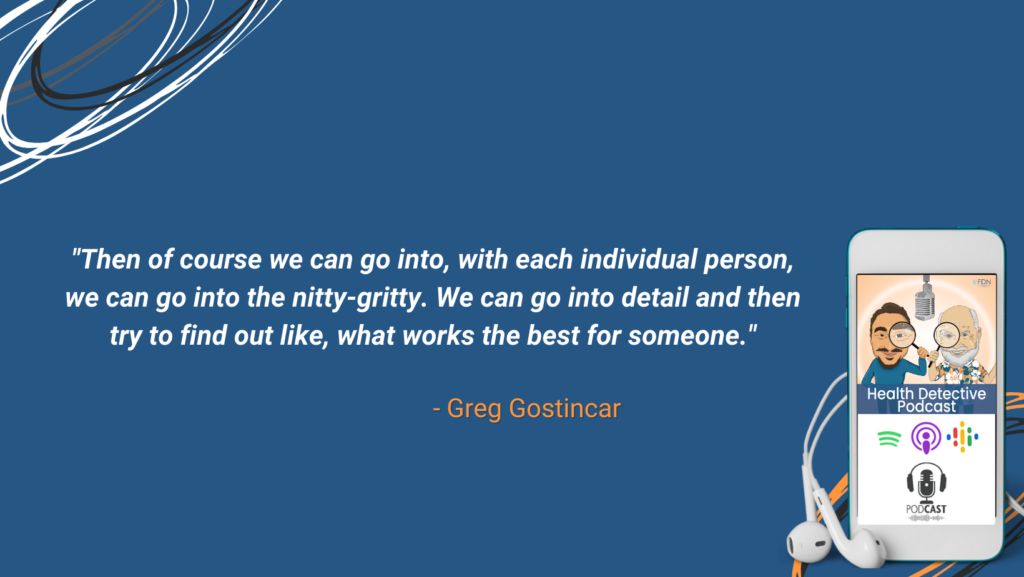
Then, still, you need to take some supplements. I mean, that’s what I generally recommend with no matter what kind of diet you eat, you need certain basic supplements. If you do that, you’re gonna have pretty good performance. Then of course we can go into, with each individual person, we can go into the nitty-gritty. We can go into detail and then try to find out like, what works the best for someone.
Limiting Fullness at Meals to Achieve Peak Brain Performance
Maybe just one thing that happened, just last week or so. I mean, it was a really funny thing and I think it’s cool to share. There was one day that I had really low energy in the afternoon. I was like, what’s going on? I slept really well. I wasn’t very nervous in the day, didn’t have much work to do.

Then I just remembered at my last meal, I ate way too many calories. So, because there was some oil on it and there’s was some stuff, I just didn’t think about it cause I was super hungry and just ate it. Then it’s a simple thing, but super important, if you can, never eat until you’re like a hundred percent full. Try to eat until you’re like 80%, 90% full. If you still want to eat this final bit of a food, just try not to. That’s just one way to kind of control the energy throughout the day.
That’s super important. I know different people promote different kinds of diets and people do crazy things when it comes to diets. That’s a problem. But if you really want to achieve peak performance, you kind of need to. It’s not the ball, like, you know, those short peaks of performance and then crashing after that and then reoccurring.
But your general performance should be on a high level, and it should be sustainable a long time. That’s what means peak performance. Because we can all work for like two weeks, whatever, then crash afterwards. That’s simple to do. But generally having this high-performance for a long period, for like months or years, basically, that’s a challenging thing.
Encouraging Clients to Do What’s Best for Them Individually
I think once you find the balance, when it comes to nutrition, is the same thing. Once you find foods that work for you and just stick to them. Don’t think about certain crazy things to stimulate their brain with different kinds of diet approaches that may be good for short-term performance but will probably not be good for short-term performance.
[00:37:41] Detective Ev: Okay. I appreciate you sharing the diet thing. I also appreciate that you don’t promote that necessarily to anyone else, right? This is what worked for you, and it might work for some other people and certainly it does. But yeah, that’s why we don’t get dogmatic here.
I will be honest, generally speaking, I’ve seen most of the people on this podcast that have overcome these crazy health challenges, have found themselves in a modified paleo, or even like a keto type of diet. But I’ve also had people on here that are pure hardcore, it’s not even plant based, I mean, they are vegans to a T. And they’ve had incredible health transformations as well.
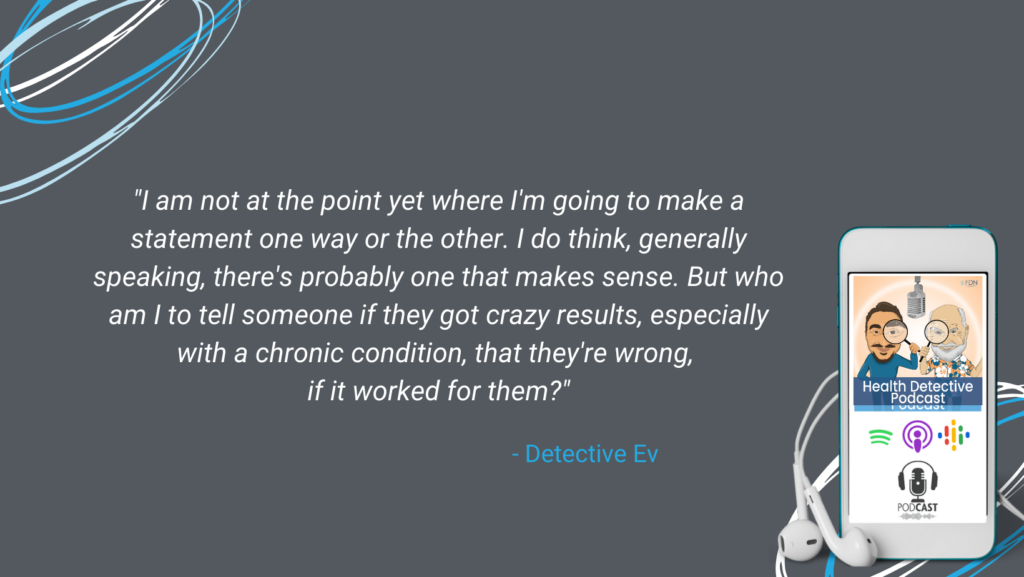
I am not at the point yet where I’m going to make a statement one way or the other. I do think, generally speaking, there’s probably one that makes sense. But who am I to tell someone if they got crazy results, especially with a chronic condition, that they’re wrong, if it worked for them? I just want them to feel better. I think that’s cool.
It’s always good to just hear a different perspective. Hey, this is what worked for Greg. And the calorie thing. That might be a direct message to me without you even realizing this.
Eating Lower Calorie Meals to Achieve Peak Brain Performance
Because you and I, you seem like a leaner person like myself. We’re fit, but we’re lean. It’s always been this dilemma where, of course, especially as this competitive male that we wanted to do well in business. Maybe you’ve had the same hunch to do well in like fitness and stuff. So, I was always like, all right, cool. I would love to be like 200 pounds. I’m nowhere close to that.
That for me and my body is just not an easy or simple task at all. It is very high calories to be able to even get close to something like 180, let alone 200. I almost can’t even imagine 200 and how much I would need to eat to get to that level. That’s the thing.
One of the aspects of my personality I value the most, and it sounds similar for you, is our brains and our ability to just like get stuff done and figure things out and problem solve. That’s a really wonderful thing to be able to do. But if I have these large calorie meals, especially for those athletic goals I had, it has a major effect on my body and my brain. I feel sluggish afterwards. I kind of just want to go take a nap.

When I’m on a more low calorie, what most people would consider a low calorie diet, I admit, my brain just fires. I mean, it feels like six, seven years old again, where I could just memorize everything really quick in school. But I lose that temporarily if I have these huge calorie meals.
Is that a common problem for a lot of the people that you work with? Are they overeating a lot and that leads to that sluggishness?
Skipping Meals to Achieve Peak Brain Performance
[00:39:52] Greg Gostincar: Definitely. I mean, it’s been the problem for me. I tried to figure out, why is this the case? I talked to different experts, and they try to explain to me. But I see this quite often actually.
As soon as people just skip one meal, which is not necessarily I’m recommending for a long time. Like if you feel like skipping one meal is a good thing. Okay. Try it. But maybe you don’t have to do it for the rest of your life. Maybe you want to, it depends.
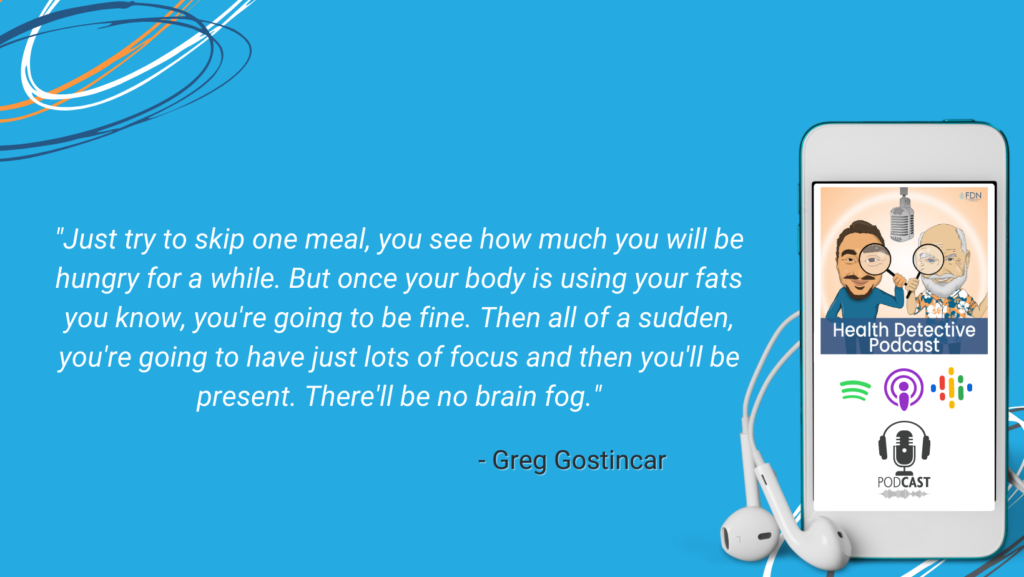
But just try to skip one meal, you see how much you will be hungry for a while. But once your body is using your fats you know, you’re going to be fine. Then all of a sudden, you’re going to have just lots of focus and then you’ll be present. There’ll be no brain fog. You know, it happens so quickly.
That’s the funny thing. It’s often, I think, quite difficult. Like you mentioned, it’s taking care of your brain and trying to build up muscle at the same time or gain weight, maybe been even harder. What I learned is that the best diet for your brain is also the best diet for gut and it’s the best diet for your heart. What we know right now, it seems, to be the best diet for longevity as well.
We’ll see if that’s really the case. But at the same time, it’s not necessarily the best diet for building up muscles or maybe like gaining weight, again super bulky guy, you know?
Trying to Do it All Hinders Peak Brain Performance
That then is the question. What’s your priority? Cause you can’t really have everything. And if you look at those successful gurus and motivational speakers, I mean, that’s a whole other thing. Those guys who were like generally 40, 50 plus years old and they had their success, then they had time to work on their bodies and whatnot. They work with many trainers or someone. That’s a whole other thing. You cannot just do everything at the same time. I think it’s almost impossible.

The last thing I want to say here is the biggest mistake that people do is like, they want to get all that. They want to have this successful career, start a successful business or whatever, they want to look amazing, like all those bodybuilders and whatnot. They want to do other things. They want to take care of their family. And then they want to have some private life as well. There’s just too much for the system. You cannot have everything. At the end, you actually don’t need all of that.
That’s my message. That’s how I see it.
[00:41:45] Detective Ev: Well, that’s really well said. Because I think some people on this podcast listen regularly would know this. I started studying successful people and self-help and personal development before I started even the health stuff. I was interested in that first. And you’re right, because this is what’s happening in today’s world, especially to the younger people like us. We’re following these people who are very public now. Before, if you wanted to see them, like 20, 30 years ago, you had to like either go to a specific conference or you could read one of their books. And that’s great. That’s helpful.
Focusing on One Goal at a Time for Peak Brain Performance
It’s not the same engagement that we have with them today, where these people, not only are on social media, my God, most of them are on it seven, eight times a day because they have the teams to be able to do that. Just filming their lives. Then you see these people, they’re like, wow, they’re working out, working a hundred hours a week. They’re doing all these things.
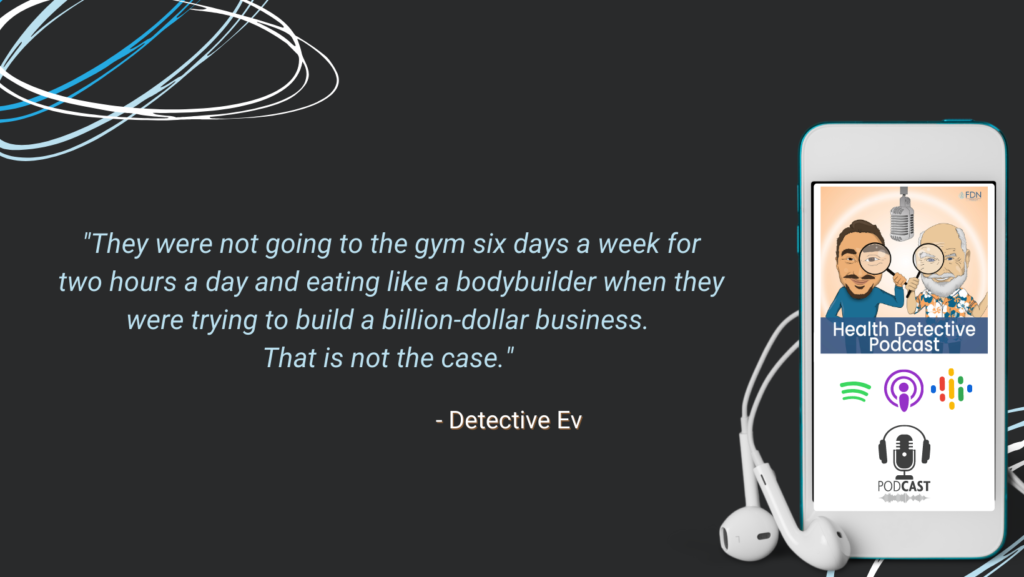
But when you actually read the stories or look at the pictures even of these people, when they were younger in that initial phase, guys, their free time and their main time was put towards the career. They were not going to the gym six days a week for two hours a day and eating like a bodybuilder when they were trying to build a billion-dollar business. That is not the case.
They were focused solely on that. It’s how you get to those places. I know again, another controversial figure. I’m not saying it for that reason, but like even looking at like a Jeff Bezos, when he’s younger, or Elon Musk. I mean, these guys are like nerdy little twigs. That’s what they look like.
But these were the future business moguls of the world. Warren Buffett still drinks, you know, his Coca Cola or whichever one he has, I forget. I mean, these people aren’t particularly interested in that type of stuff sometimes. You get the rare cases, like an Arnold Schwarzenegger. But even him before the politics and the movies, the fitness stuff was before that. That was his main thing.
And does he work out now? Sure. But he’s not the crazy person that he was, you know, winning Mr. Olympia. He’s a 70 something year old guy now.
Being Great at No One Thing from Trying to Do Many
So, I think that’s really one of the most important parts of this podcast for performance is just focusing on one or two things. That is very tough in a world that tells us to focus on a million things and almost makes us feel socially obligated to do so. Like you’re not worth enough or you’re not good enough if you don’t do all those things. I think that’s kind of crazy.

Then I’ve done it before and you end up, you know, being okay at a lot of things, but great at literally none.
[00:43:58] Greg Gostincar: I totally agree. Actually, a funny thing that you mentioned, an idea popped up. There was one guy recently, he replied to one of my comments on one of my YouTube videos. He said like, you know what, I don’t trust you. You don’t look like big enough and you kind of need to build muscles. Like why would I trust you? There’s this idea that those successful people are also like big. I’m talking about men now, but you know, also women, they look the way they do, they’re supposed to, at least.
This is completely wrong with our society. There are many reasons why this is wrong. But yeah, if you want to achieve peak performance, if you want to have a successful career, I think it’s going to be super challenging if not impossible, to do many things at the same time. Just do one thing. Become successful if that’s the goal. Like build a business, if that’s a goal. Whatever it is.
Avoiding Mental Crashes by Strictly Organizing Schedules
Of course, in the process, you need to work out, you need to take care of your diet. You need to take care of yourself, obviously. But if then you have another goal, which is like, becoming whatever, like building your muscles and going on competitions or whatever it is, that’s fine. You know, do it. But if you do everything at the same time, eventually you will crash. I think, most people will. Maybe one in 1,000,000 won’t, but everyone else probably will. It’s totally unnecessary to do it. You know, it’s preventable.
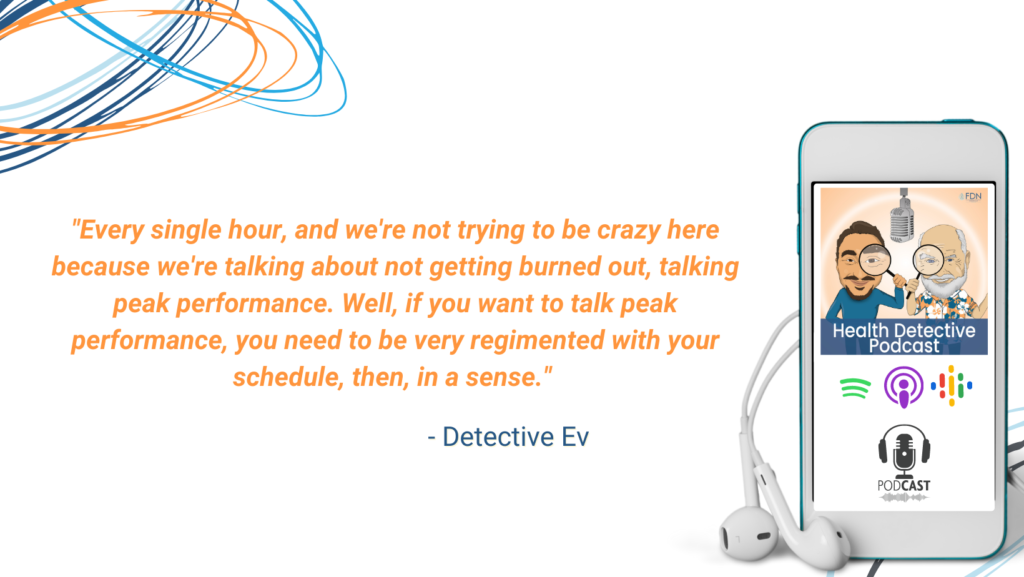
[00:45:07] Detective Ev: Say you have a dream career or a business that you’re trying to start, whatever, right? Every single hour, and we’re not trying to be crazy here because we’re talking about not getting burned out, talking peak performance. Well, if you want to talk peak performance, you need to be very regimented with your schedule, then, in a sense.
Every hour that you are sacrificing to, you know, all right, I’m going to be the biggest person ever. No one’s saying don’t exercise, but like being the biggest person ever, two-hour sessions a day, all that time you’re putting into that, is less time that you’re putting into that other thing that you claim is your dream or whatever. It’s almost like, yeah, go get that done, go figure that out in your own way. Then I think you have a lot more freedom and flexibility to do those other things.
Where to Find Greg Gostincar
So Greg, obviously I don’t think you’d be on this podcast today, if you didn’t work with people all around the world. So where can people find you if they were interested in your services or what you offer? Just learning more?
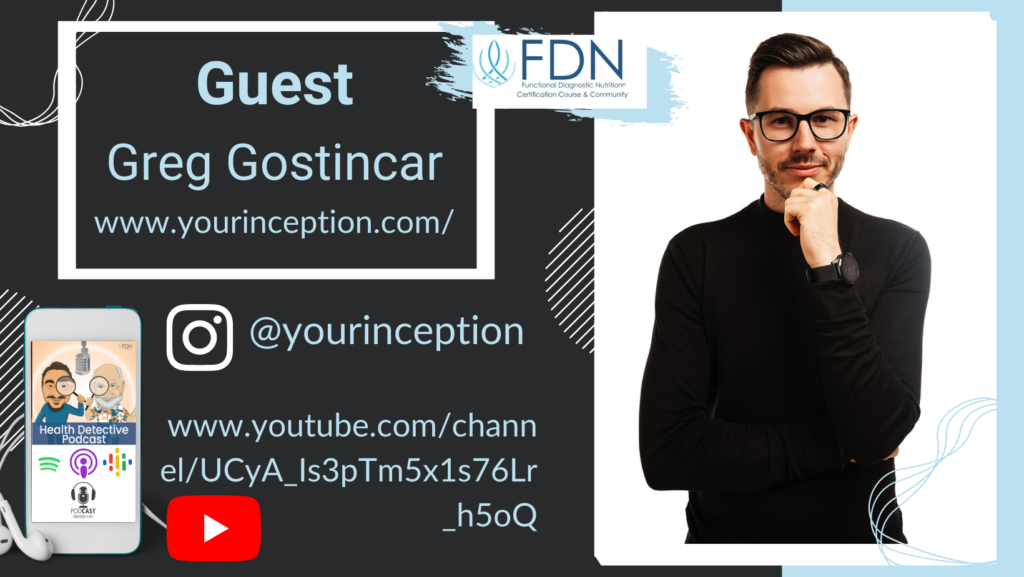
[00:45:52] Greg Gostincar: They can go to my website, yourinception.com.
We have YouTube channel starting with the same name, your inception. Social media, Instagram and so on. So yeah, that’s where they can find all information, reach out to me. They want to say hello, whatever.
[00:46:04] Detective Ev: Good name. I like that. Okay, cool.
Health Detective Podcast Signature Question
Then Greg, we finish up with the same question always on this podcast. And I know I asked you before what were like the three performance hacks. So, if it happens to overlap, that’s totally okay. I don’t want to throw you off too much here.
But the question that we always finished with on this podcast is if I could give Greg in this case, a magic wand, and you could get every single person in this world to do one thing for their health, what is the one thing you would get them to do?

[00:46:30] Greg Gostincar: I think it’s fair to say that since we talked about it a lot, then we both know the effects of that. It’s controlling the light, basically. I think that’s like the simplest thing to do, and it has so many benefits and people can actually see the benefits in a very short time for free. It’s out there. So, I think that would be the one. Yeah.
FDN Summer Open House
[00:46:49] Detective Ev: All right, guys, that’ll do it for today’s interview with Greg Gostincar. First guest out of Slovenia. Pretty darn cool. I also think it’s crazy how this just proves that these issues are happening everywhere in the world. Because even if Greg didn’t have the normal health issues that many of us have, you probably noticed the similarities in the solutions he’s come to find. That probably means that many of the people that he works with have similar problems to the people who have come on this podcast or eventually will need something like what FDN offers.
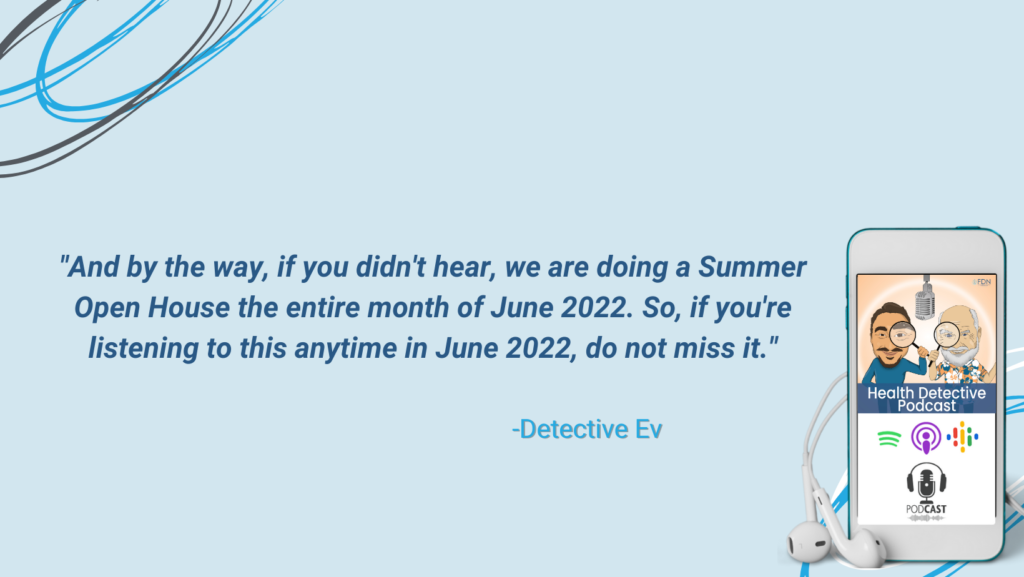
And by the way, if you didn’t hear, we are doing a Summer Open House the entire month of June 2022. So, if you’re listening to this anytime in June 2022, do not miss it. The course is going up by a thousand dollars on July 1st, 2022. This is to match the large amount of additional content that’s come in over the last couple of years. The labs alone that have been added almost account for that entire cost, but there is about 20 to 30 hours I think of extra stuff now between extra mentorship, course information, or lectures rather. It’s pretty cool what FDN does.
And if you don’t know this part, this is kind of my favorite thing, and I’m very glad I joined five years ago. FDN gives you, it’s not really lifetime access per se, but what it is is as long as you’re an FDN in good standing, someone that does their recertification stuff, and recertification stuff for us is a certain amount of continuing education hours, which can actually be met with certain things that FDN offers, it’s a $99 recertification fee every two years.
Conclusion
But what that will do is that actually allows you to get lifetime updates for the course. You will never lose access to it. You will get everything that the new people are getting when they start. I think that’s pretty cool that they do that. And it’s led to me getting an incredible amount of extra content over the years.
So again, depending on when you’re listening to this, we’re doing events all month. We have different webinars every weekend. We have events, including like course tours and allowing you to sit in on events that are normally exclusively for trainees or graduates. You can actually hop on those as someone considering the course.

Then on June 28th, 2022, it’s our big event with Reed Davis, the founder of FDN. He’s going to be answering all the questions that you have about FDN or anything that you could possibly think of business-wise, health coaching wise, it doesn’t really matter. So, check us out there. Go to fdntraining.com/summer to learn more.
And if you would be so kind as to leave us a five-star review on Apple and or Spotify, we would love ya even more than we already do. And I’m assuming you like us, if you’ve listened this far in the podcast. So, please go do that. We do really appreciate it, and it helps get this information to more people.
That is all for today, though. I’m looking forward to talking to you guys again soon. But until then, take care.

